#bnha translation
Text
Reading the Japanese fandom reactions, the VIZ translation of All Might's words to Shouto don't really do justice to all the warmth / nuances / poetry / references:
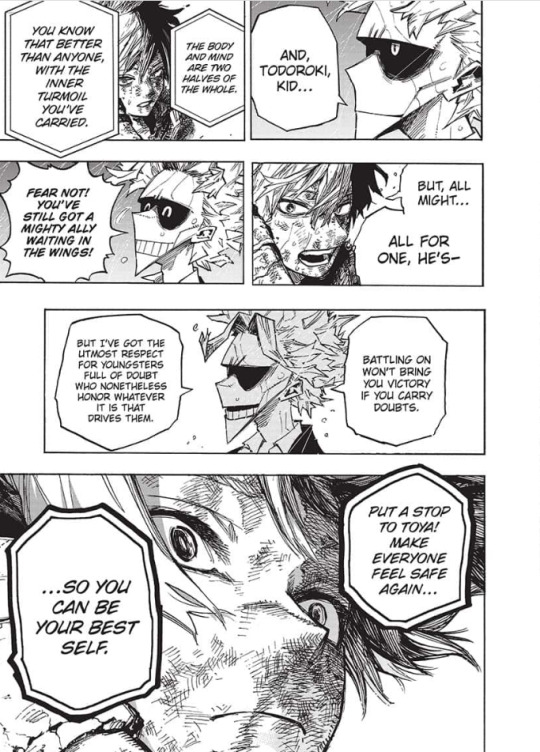
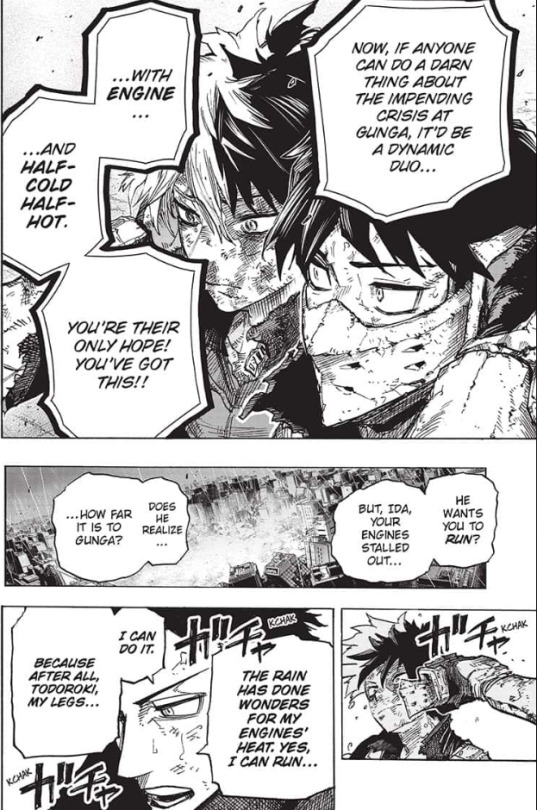
A couple of phrases I see particularly mentioned is:

In this panel, a lot of people mention the phrase:
何より尊い - meaning "most precious"
All Might is talking about how Shouto "worried and wondered" - which in the story have been only put in negative way so far. From Bakugou calling him "half-assing" to Touya telling him he's a "half-baked puppet" and even Shouto himself saying that he's half-hearted.
But All Might validates all this emotional struggle and what Shouto's heart decides in the end by calling it most precious. (Maybe, because All Might himself, especially post-Kamino, is not a stranger to doubt and feeling lost).
Another phrase I keep people referring to is "Kimi ga kimidearu tame ni"
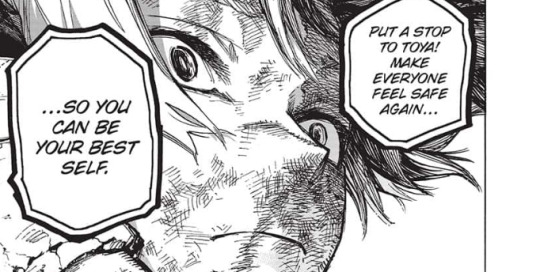
君が君である為に - because you are you / for the sake of you being you
People made the link with how Shouto was created for Endeavor's purpose, how he's seen as Endeavor's son / Dabi's brother, how long he's been searching for an identity.
The EN translation implies that All Might is telling Shouto to reach his potential, but the JPN fandom seems to interpret this more as All Might validating Shouto's own individuality, to be able to follow the path he decided in his heart.
Being himself is more important than his quirk or who he is related to. And the path he decided in his heart is both to save his family and put people at ease.
This line connects all the way back to Shouto's origin chapter and All Might explaining what "I am here!" means - i.e. recognizing himself.
145 notes
·
View notes
Text
BNHA 389 Japanese to English Translation + Commentary
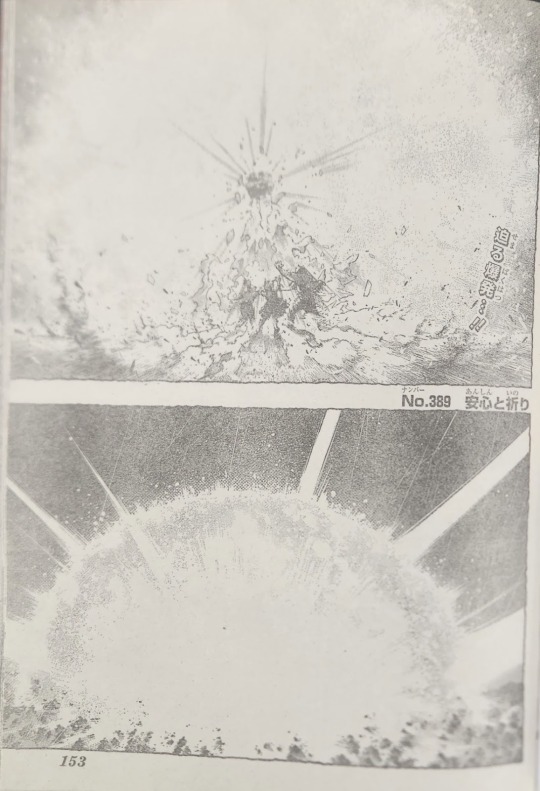
迫る爆発…‼︎
せまるばくはつ…‼︎
The imminent explosion…!!
No.389 安心と祈り
ナンバー389 あんしんといのり
No.389 Assurance and Prayer
安心 (romaji: anshin) is a noun meaning “peace of mind (as is inspired by the trust you feel through faith in a higher power or a person whose actions have proven them to be a reliable and trustworthy source of comfort); relief; (sense of) security; safety; assurance; confidence.” Ultimately, it makes no difference whether one translates this word as “relief” or “assurance.” What matters is that this word, which makes up the first half of the chapter title, refers to Shouto, who has achieved his identified goal of becoming a Hero who, like All Might in his heyday, “reassures others and puts them at ease” with his mere presence. Because Shouto specifically stated that he wanted to become a Hero who “reassures” people, that is how I chose to translate anshin.
The second half of the chapter title, “prayer,” is a reference to the frightened civilians, many of whom are shown praying for a savior throughout the chapter. Shouto is the answer to their prayers, as All Might was in the past. This became possible for Shouto when he chose to stop Dabi through any means necessary, despite their blood connection and Touya’s visibly precarious health. The civilians were initially wary of Shouto after Dabi’s reveal because they could not be certain that Shouto would not choose his personal obligation to his brother over his professional obligation to the civilians, but Shouto proved that he is someone Heroes and civilians can trust to put “Hero” first by insisting on being the one to “fight” and “stop” the “Villain” Dabi, ignoring Touya’s every effort to connect on a familial level, and focusing exclusively on “subduing” the threat Dabi posed to Heroes and civilians. Their battle was not so much brother versus brother as it was Hero versus Villain, and Shouto was prepared to win to save, whatever the cost. Horikoshi LOVES to use splitting faces vertically into distinct halves as a visual metaphor for conflicting aspects of a person. For both Shouto and Enji, their scarred (left) side, which for Shouto happens to correspond to his fire, represents the Hero profession and their commitment to it. It represents who they want to be as Heroes. The scarred portion of their faces is emphasized when they are showing up as Heroes first, while the smooth, unscarred portion of their faces is highlighted when they are showing up as people first. If you revisit the Shouto- and Endeavor-related chapters of the war thus far, you’ll notice a pattern: Shouto is almost always drawn with his scarred “Hero” side spotlighted and Endeavor’s face is drawn full-on, both sides equally represented (and conflicting), more often than not. Symbolically, this indicates that Shouto was not approaching Touya as a brother. He was approaching him as any Hero would any Villain, and that (and other reasons) is why he failed. Endeavor, for his part, is caught between competing interests. Enji is Touya’s father and needed to have shown up as a person first if he was to have had any hope of reaching him, but he is also the Number One Hero and has a responsibility to Japan and the world to stop the Villains, even if that meant turning his back on his family (= Touya) one more time to prioritize dealing with AFO, as the war’s tactical team stipulated and Shouto demanded, and even if it now means that all he can do is die with Touya in a fiery inferno that should have, could have, and would have been avoided had he at any point prioritized being there for his firstborn son over being a Hero. It seems that in the end Enji was a shitty father, but Endeavor was an awesome Hero.
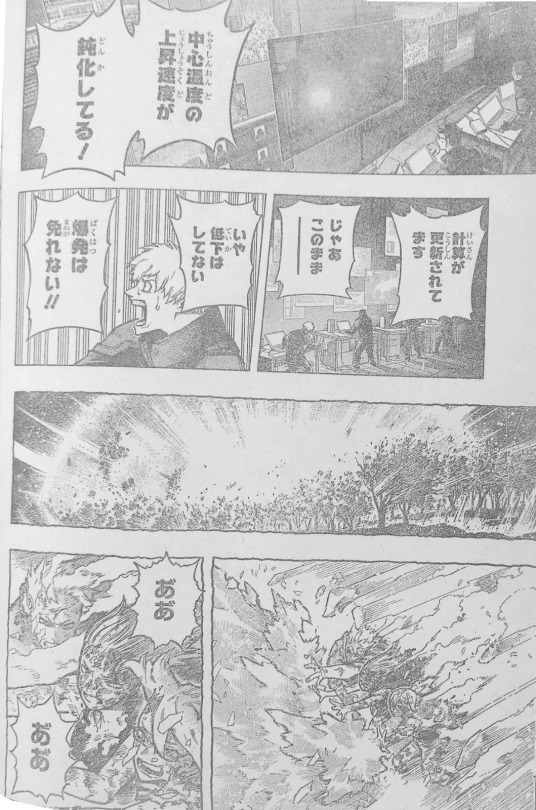
中心温度の上昇速度が鈍化してる!
ちゅうしんおんどのじょうしょうそくどがどんかしてる!
= “The speed at which the core temperature rises is slowing down!”
計算が更新されてます
けいさんがこうしんされてます
= “[I am] updating the calculations!”
じゃあこのまま————
= “So, keeping the same [pace]———”
いや低下はしてない
いやていかはしてない
= “No, it’s not slowing down!”
爆発は免れない‼︎
ばくはつはまぬがれない‼︎
= “The explosion is unavoidable!!”
免れる (romaji: manukareru) is a verb meaning “to escape (disaster, death, etc.); to be saved from; to be rescued from; to avoid (e.g., punishment); to evade (e.g., responsibility); to avert; to elude; to be exempted from.”
What is being communicated is that the situation is such that a massive, high-pressure explosion is inevitable and everyone unfortunate enough to be caught in the estimated 5-kilometer blast radius will be incinerated. It cannot be contained. It cannot be stopped. There is no escaping it.
ああ
= “AH”
ああ
= “AH”
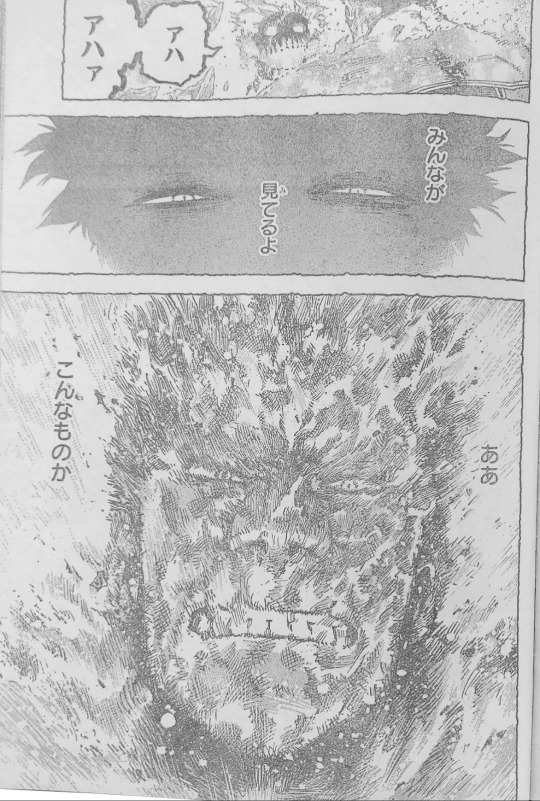
アハ
= “AHA”
アハァ
= “AHAA”
I’m torn between thinking this is the sound of Touya breathing haggardly and thinking he is trying to laugh… He did say, “Whether [a person] cries or laughs, tomorrow comes equally. So, let’s laugh, Himiko Toga. People live to laugh! … The ones laughing at the end of that (= the Miserable Parade) will be us” (No.341).
みんなが見てるよ
みんながみてるよ
= Everyone is watching / looking at [me].
ああこんなものか
= So, this is what it’s like?
もの (romaji: mono) is a common Japanese word with a number of uses. It can function similarly to the English “because” and indicate that the speaker is attempting to explain and/or excuse something or it can express emotional involvement, often frustration or dissatisfaction. Here, it appears as a sentence ending particle suggesting that Touya remains unhappy despite finally having his family’s attention.

こんな簡単な事だったなら
こんなかんたんなことだったなら
= If it was such a simple thing,
Look at that lopsided smile. He’s proud of the Miserable Parade. This is the Heroes getting their “just desserts.” This is Touya Todoroki and Himiko Toga taking a stand for the children they were and striking back at the people who did and have continued to make their lives miserable.
撤退だァ
てったいだァ
= “Retreat!!”
巻き込まれるぞ退けえ‼︎
まきこまれるぞひけえ‼︎
= “Withdraw or you’ll be caught in [the blast zone]!!”
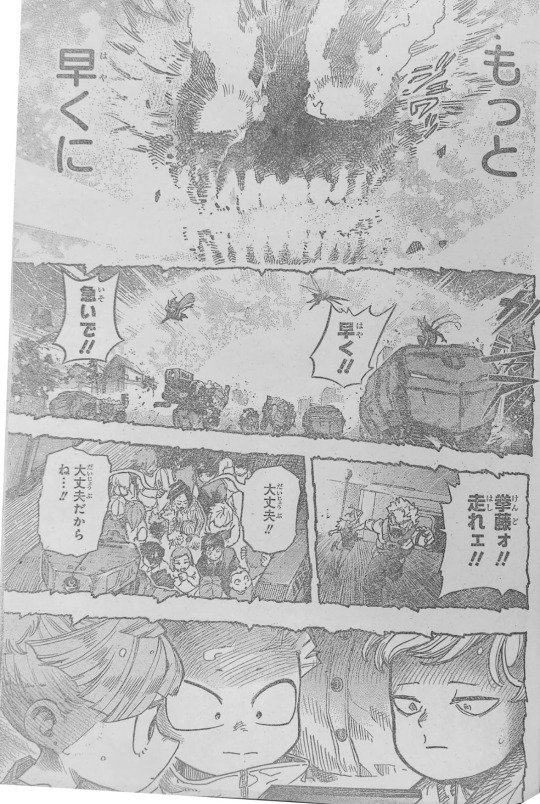
もっと早くに
もっとはやくに
= [you should have done it] sooner.
Let’s talk about Touya’s final line of the chapter. Beginning on page 6, Touya says, “If it was such a simple thing...” If identifies this as a conditional statement, that is, a statement with a clear hypothesis followed by a logical conclusion. The conclusion is the result of the hypothesis. The basic structure of a conditional statement is “if this, then that,” albeit not all conditional statements are written in the “if-then” form.
The next thing Touya says is “sooner.” Yes, just that. You see, Japanese doesn’t require that every word be given when the meaning can be inferred from context. The second half of Touya’s conditional statement is composed of just two words and one particle: もっと早くに. もっと (romaji: motto) is an adverb meaning “more; longer; farther; further.” 早く (romaji: hayaku) is another adverb meaning “early; soon; quick; fast.” Literally, Touya is saying, “If it was such a simple thing [to look at me], more soon / more quick / more early.” That is a fine sentence in Japanese, but it raises more questions than it answers in English. What does Touya mean by “more soon / more quick / more early”? Context clues can help us to answer that question. There are four types of conditional sentences. Touya’s is the third type, which is “used to explain that present circumstances would be different if something different had happened in the past” (https://www.grammarly.com/blog/conditional-sentences/).
Had Touya’s family acknowledged him sooner, none of this would have happened. Their damning inaction led to his damning action. For two decades Touya had believed that if his family would only look at him, everything wrong would be made right. Now they are looking at him, but nothing has changed. Their acknowledgement comes too late to save his life (or theirs). He burned to death as a child on Sekoto Peak because of their negligence, and he is burning to death as an adult on Gunga Mountain because of their negligence. “Sorry, it’s my fault” doesn’t change reality. It can’t undo the hurt, heal the damage, or rewrite history. It can’t give Touya his life back. Horikoshi has long described the Todoroki family as “Hellish,” but only Touya was actually consumed and destroyed by it. No one else died, and everyone else had at least one person supporting them. Touya was scapegoated and had no one, and it shows when you compare his outcome to his siblings’ outcomes and even to his parents’. This all could have been avoided had the Todorokis sincerely reached out to Touya any time prior to being threatened with their and everyone else’s impending doom and gloom, but they didn’t. Touya, or Dabi, appears to have not forgiven or forgotten their ambivalence. After all, “the past never forgets” (Viz’s translator exchanged “forget” for “die” to create the iconic Dabi line “the past never dies”; that’s a devastatingly cool one-liner, but it’s not what Touya/Dabi actually said). And consider this: Can the apology of a person with a smoking gun pressed to their temple be trusted to be sincere, or are they just saying whatever they think the would-be shooter needs to hear to keep from scrambling their brains? To be clear, I am NOT saying that Enji and/or Rei are lying about being remorseful for abusing and neglecting Touya. What I AM saying is that Touya has no reason to believe they are being honest (before now, they wouldn’t even acknowledge him). Even if we assume that he does believe them, that does NOT guarantee that he will forgive them—or anyone, for that matter—for what happened.
Personally, I am NOT of the opinion that Touya INTENDED to store up thermal energy to trigger a mass-scale explosion. Not long ago, in No.351, Touya was screaming for Shouto to “burn and die for our sake,” which implied that he was fighting not only for someone else’s freedom and survival (= the League of Villains’) but for his own. It would not make sense, then, for Touya to INTENTIONALLY do anything certain to jeopardize both his life and safety and theirs, like the police and Heroes imply he did. We know Touya cares about the League of Villains, but the police and Heroes don’t know that, and when Touya alluded to caring about the League of Villains during his match against Shouto and three of Endeavor’s sidekicks, Shouto and the other Heroes ignored him. They were there to take Dabi down, not to try to understand and sympathize and relate with him. What matters to him does not matter to them. His “personal and ideological” (his words, not mine) reasons for fighting in the war are irrelevant (to the police and Heroes).
Touya’s Quirk is tied to the intensity of his emotions. The more passionately he feels about something, the more powerful and difficult to manage his fire becomes. Touya became increasingly upset as his and Shouto’s battle went on and the condition of his body deteriorated. He tried unsuccessfully to escape the situation by killing Shouto and the others and was blasted by Phosphor, the equivalent of a high-powered extinguisher designed to protect everyone else from his flames, several times, further damaging him and preventing the extreme heat generated by his Quirk from being more gradually released into the atmosphere, causing thermal energy to build up inside his body to an explosive degree. At the time of Shouto’s final combo attack, Touya was sure he would be killed if he was unable to replicate Shouto’s Phosphor. His ingenuity and strong will to live, or at least not to die, are what allowed him to copy the special technique Shouto had spent considerable time developing and has yet to perfect. Upon regaining consciousness, Touya marveled at his good fortune for having survived Shouto’s finishing move but realized that he would physically fall apart before reaching Endeavor if he wasted any more time on Shouto and the other Heroes, so he called out to Skeptic for help and soon after was warped to the Gunga Mountain Villa Ruins. Touya knew before he had even left the Kamino Ward that he was dying. That would upset anyone. And because he can’t calm down (emotional state), he can’t cool down (physical state) enough to prevent the explosion from happening. Rei, Fuyumi, and Natsuo have been trying for THREE chapters to force-cool him to no avail. How much good is spraying cold water on a raging inferno going to do when it’s fueled by emotions that have only superficially been addressed? What Touya needs is to be comforted and soothed, but the Todorokis don’t seem to know how to comfort and soothe him. And of course they don’t. This is someone they pretended not to see or hear until very recently, someone they turned away and turned away from. How would they know how to console him, and how much comfort are they to him anyway?
There are, of course, other ways to interpret Touya’s lines. Pikahlua is a popular translator here on Tumblr and one I respect. What I translated as “if it was such a simple thing, [you should have done it] sooner” they translated as “if it was as simple as this, [do it] sooner.” They explained their reasoning in this post:
I differ from Pikahlua in that I believe the complete sentence would read more like “you should have done it sooner” than “I wish you had done it sooner” or “do it sooner next time” (I don’t think Touya means for there to be a ‘next time’, and he surely doesn’t expect to live for there to be a ‘next time’). Why do I think that? Well, for starters, “you should have done it sooner” sounds more like Touya/Dabi to my ears than Pikahlua’s alternatives. Then there’s the matter of the illustrations. Touya/Dabi is NOT the first character to be drawn featureless save for their eyes. Himiko and AFO have also appeared like this (in No.348 and No.364, respectively). In both cases, it signaled something very, very bad for the Heroes. Why would Touya/Dabi be any different?
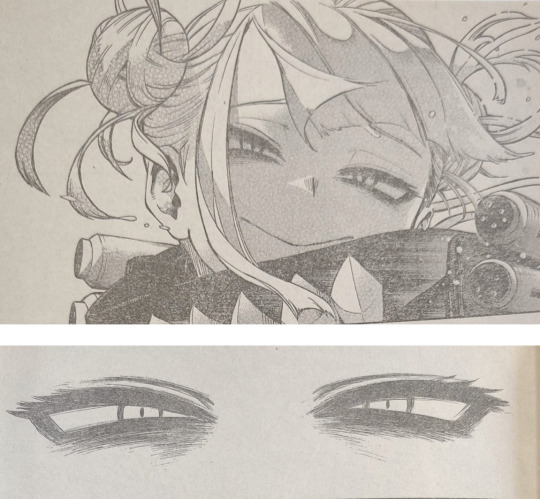
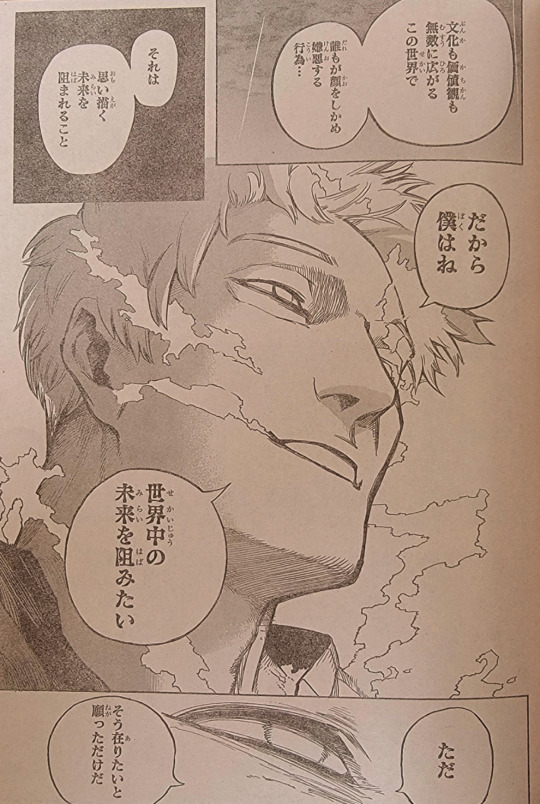
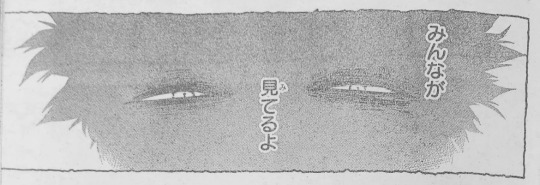
Touya/Dabi and Himiko/Toga in particular look alike. In fact, they look so much alike I can’t help but wonder if the likeness was intentional on Horikoshi’s part:

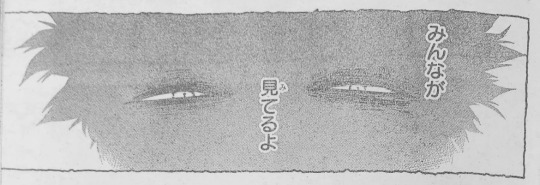
早く‼︎
はやく‼︎
= “Quickly!!”
急いで‼︎
いそいで‼︎
= “Hurry!!”
拳藤ォ‼︎走れェ‼︎
けんどォ‼︎はしれェ‼︎
= “Kendou!! Run!!”
大丈夫‼︎
だいじょうぶ‼︎
= “It’s okay!!”
大丈夫だからね…‼︎
だいじょうぶだからね…‼︎
= “It’ll be okay…!!”
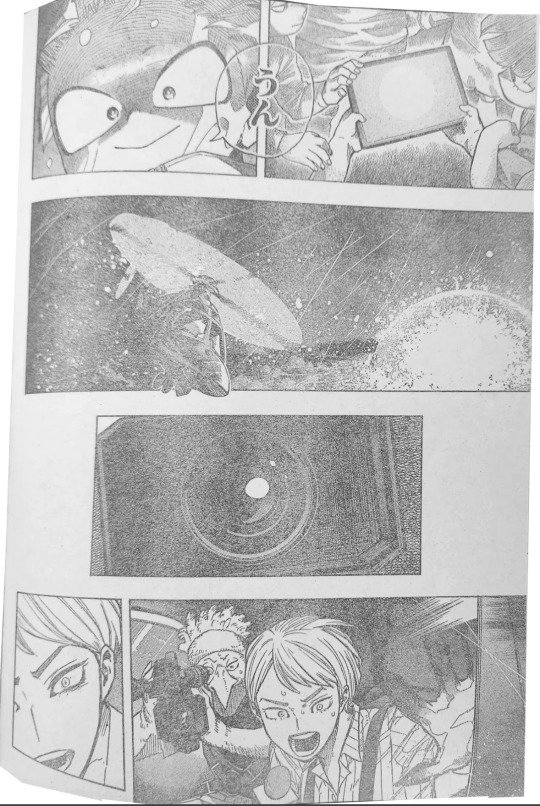
うん
= Yeah.
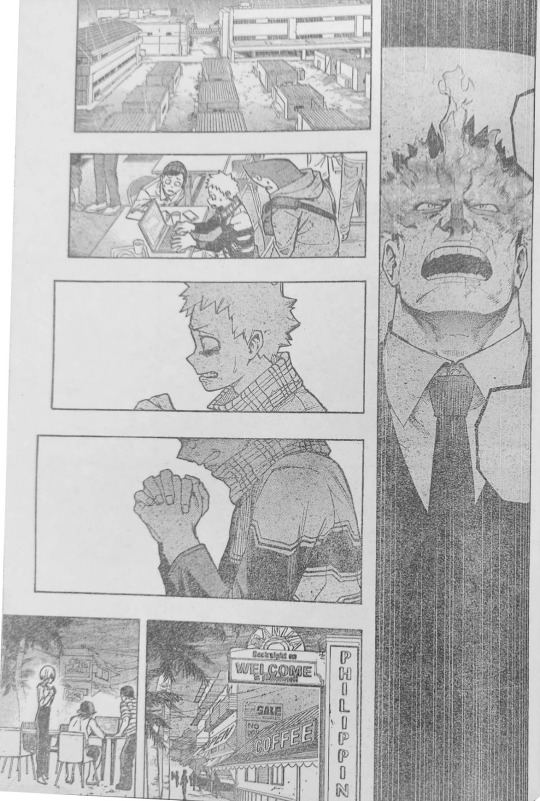

だって俺たちには———
だっておれたちには———
= “Because we [have]———”
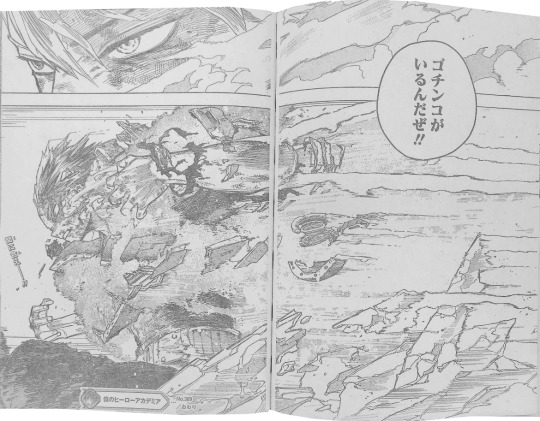
ゴチンコがいるんだぜ‼︎
= “Five Weenies!!”
間に合え——‼︎
まにあえ——‼︎
= Just in time——!!
Take a close look at Shouto’s face. See that scar? That’s his Hero side. He’s charging onto the battlefield the same way he did last time: as a Hero. See that cold, hard stare? That’s also the same as last time. Compared to Shouto’s “inner teen,” Touya’s looked like a hit dog. He looked like a kid outnumbered and jumped in the locker room by schoolyard bullies. Shouto looked like a vicious wolf, ready to kill; Touya looked like a ram, primed for the killing but trying to project strength and confidence. The week that No.351 dropped, I saw a lot of people on my Twitter timeline claiming that these representations of Shouto and Touya are the same age, but that isn’t true. Their uniforms provide insight into their approximate ages. Shouto is wearing his Sports Festival uniform. He was 15 during the Sports Festival, so his symbolic representation is 15. Touya is wearing a standard black middle school uniform, the same one he is wearing in the photograph on the butsuden.
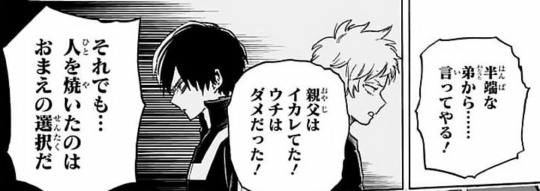
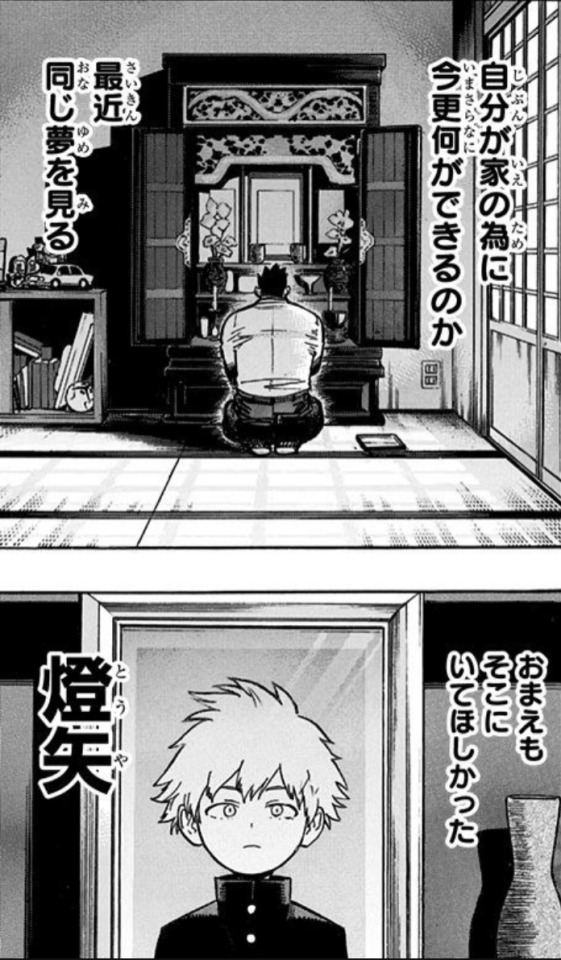
The most recent picture of the deceased is placed on the butsuden. Touya’s picture was probably taken just before the winter break from school, during which time he disappeared and was presumed to have perished in the terrible fire that scorched Sekoto Peak. He was 13, a week or two shy of his 14th birthday, and still in middle school (8th grade). Shouto was 15 and a high school freshman (10th grade). Schoolboy Touya is two grades younger than Sports Festival Shouto.
While we’re on the subject, and since I have no idea when or if I’ll ever get around to fully translating No.349-352, let me go ahead and point out that Touya is the only person in the series other than Ten/Tenko/Tomura (and Kaina, if you count Horikoshi’s extras) to have more than one “inner child.” The version of Touya’s “inner child” we see in No.351 (“Schoolboy Touya”) is NOT the version of his “inner child” we see in No.352 sobbing and shrieking as Shouto punches and blasts through him (“Sekoto Peak Touya”). It is also NOT the version of his “inner child” we saw in Vol.31 standing alongside Keigo with Endeavor looming overhead (“3-Year-Old Touya”). Here are all three of Touya’s “inner children,” for reference:
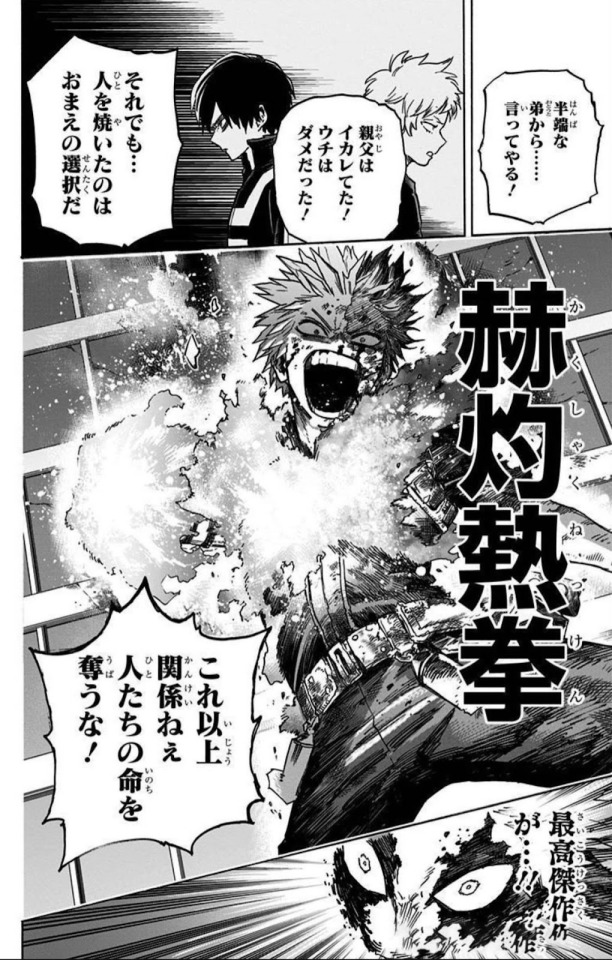
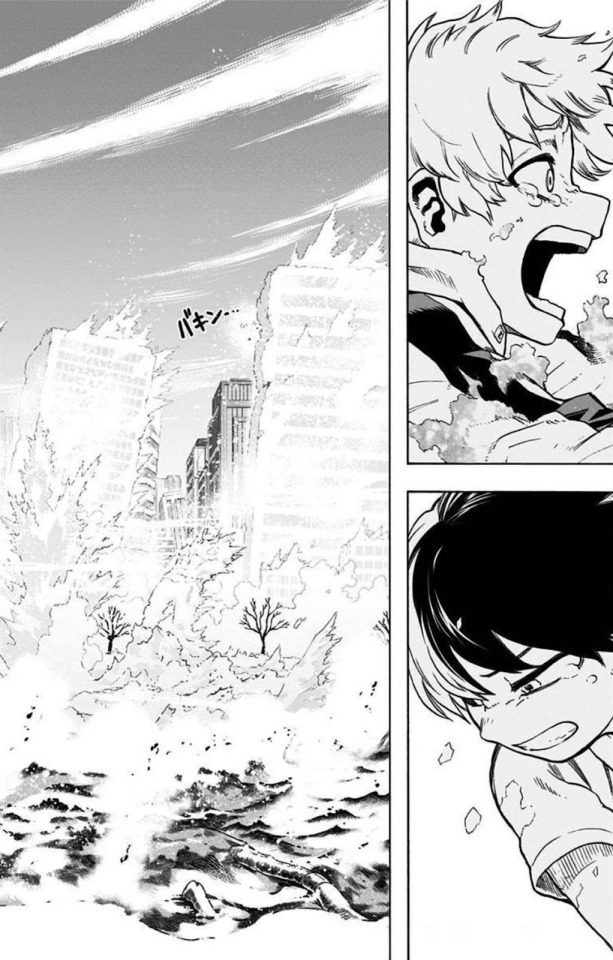
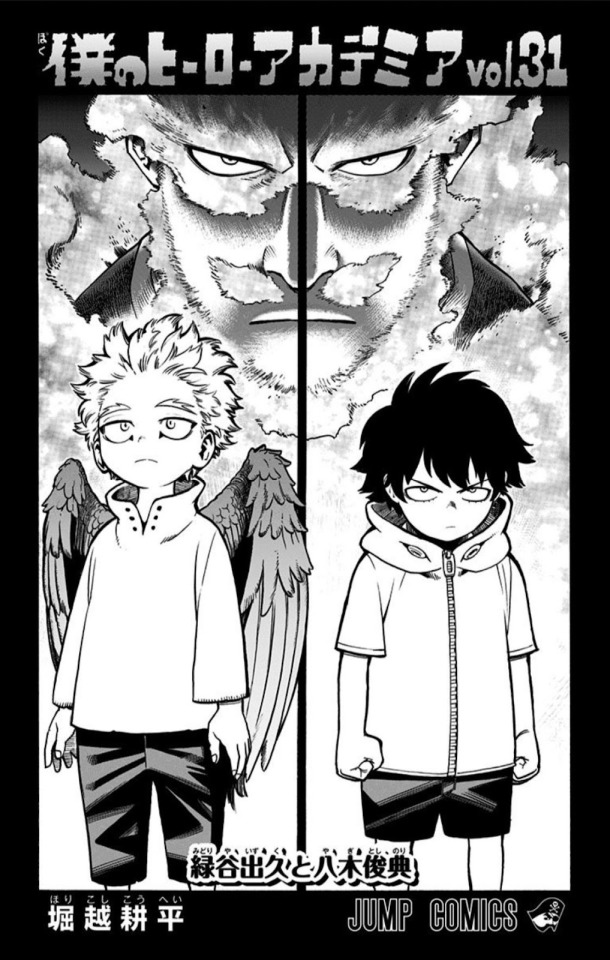
Note that with the exception of the Touyas and the Kainas (child, teen, adult), every other character’s “inner child,” or “core self,” is between the ages of 3 and 6. Izuku and Katsuki’s “inner children” are 4, Shouto’s is 5, Keigo’s is 5 or 6, and Himiko’s is 3. Tomura has two 5-year-old “child” selves (one with black hair, pre-massacre, who I call “Ten,” and one with white hair, post-massacre, who I call “Tenko”) and one “adult” self (“Tomura”). Touya’s “inner children” are 13, 13 (slightly older), and 3. I chose not to include “Dabi” in that list as another one of Touya’s “inner children,” but if we were to consider him one, I think 17 would be a good guess at his “age,” as that is how old Touya was when “Dabi was born” (No.350).
End.
#bnha#mha#bnha manga spoilers#mha manga spoilers#bnha 389#mha 389#bnha translation#mha translation#touya todoroki#dabi
21 notes
·
View notes
Text
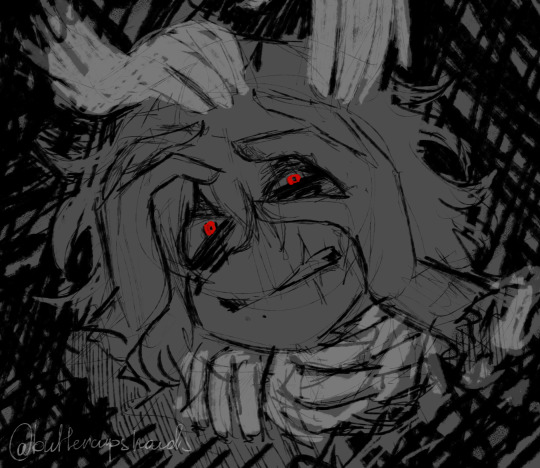
can you even call it a warm up if I'm going to bed without drawing anything big

and a sketch I made while sitting in the park today
#sketch#my art#bnha#shigaraki tomura#tenko shimura#all for one#midoriya izuku#bnha manga spoilers#only after I finished basically polishing this sketch did I notice how it's basically dark and light mode#also the first one is basically a redraw of illustration from vol 11#I know that translation of Tenko's words is different in official but eh#fanart#I've kind of recovered from recent chapters#and I was analysing those chapters all morning#I'm still thinking but otherwise the chapters are so good#also did you notice that AFO actually talked about how his other him didn't use that 'last thing' yet and that was in ch 410#and in ch 419 he did so it's real and it's still sad#but still AFO was never hiding it enough#from Tomura maybe but we as readers actually saw his plans play out#in any case I'm still just sitting with those two Izuku and Tenko interaction chapters#I waited long enough#and if you don't count AFO's return Izuku DID save Tenko and it's so interesting#since he now has to save his OTHER origin that was in ch 237 taught to kill whatever he wants#Tenko and Tomura both had 'origins' chapters and for now we only worked with 235 and 236#and even if Izuku helped with the start of 237 there's still AFO#in any case it was a hard week#also the second thing actually had them holding hands#and then I was like 'but at that point Izuku's hands are gone oh no'#and it was just Tenko holding air where the hand was destroyed#in any case that scene.
689 notes
·
View notes
Text
Omae: Complexity of Self-Expression and Intimacy with the Japanese “You”
The anime adaption of chapter 322 is rapidly approaching, so I wanna talk about something really interesting: as far as I can tell, Izuku is the only person Katsuki has ever used the pronoun omae (おまえ) towards in-canon. Furthermore, he has only used omae towards Izuku on three occasions.
The first time is after Deku vs. Kacchan 2 in chapter 120.
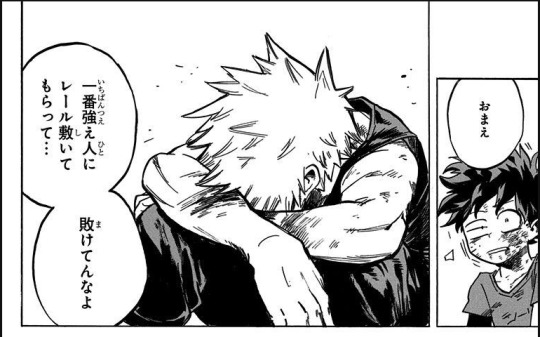
The second time is right after his apology in chapter 322. (Katsuki actually uses omae four times in a row in this scene.)
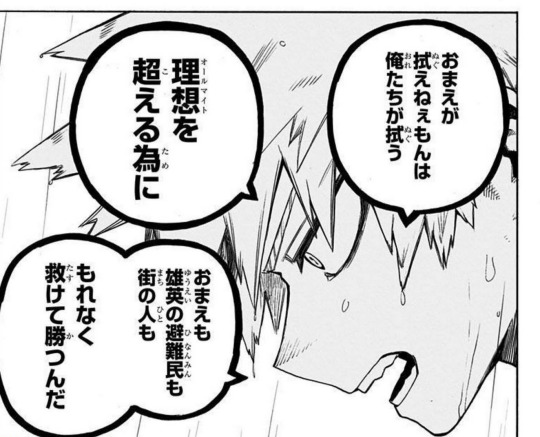
(We'll get to the third time later, just you wait.)
Why does Katsuki address Izuku differently in these scenes? To answer this, we’re gonna commit some language nerdery.
First, let’s be real about the fact that Japanese pronouns can be complicated. There are a ton of them. You learn the common uses—like you could say that, broadly, omae tends to be used by guys for their friends and romantic partners. But the reality is that in a high-context language like Japanese, pronouns can come across wildly differently depending on who uses it, to whom, with what tone, and in what context.
It is difficult to generalize real-life usage, so to be clear, I am talking about MHA as a piece of media. I could try to tell you that omae is rude but also friendly but also condescending but also comedic but also confrontational but also affectionate—and so on, but that wouldn’t help you understand what Katsuki’s omae to Izuku means and why it feels significant.
The thing is, Izuku and Katsuki can each say omae and mean completely different things, because their normal way of speaking tells us how to interpret their words.
When Izuku speaks, he is polite and considerate. He uses the boyish first-person pronoun boku (僕). In Japanese, avoiding second-person pronouns is the polite thing to do; you use the person’s surname and an appropriate suffix instead, and this is the tactic Izuku uses to address others. When he does say “you,” it is usually the familiar kimi (君) towards Katsuki.
We see Izuku use omae in only a few circumstances: he uses it towards himself during inner monologues when he is trying to figure out what to do or compel himself to act, and he uses it when he faces All For One.
Both of these involve what I think of as “tough talk”—Izuku talks tough to himself to push past his fears and be a hero. With AFO, he is talking to a villain, someone he has to defeat. From someone like Izuku who speaks with such politeness and humility, omae reads as aggressive and confrontational.
Katsuki, on the other hand, is always aggressive and confrontational. He uses the masculine, somewhat boastful first-person pronoun ore (俺) and the second-person pronoun temee (てめえ) towards just about everybody. Temee is an extremely rude, combative word; Japanese descriptions usually point out that it reads like fightin’ words—it’s what you’d call an opponent, someone you are confronting, challenging, or belittling. As mentioned, you’re supposed to avoid “you” words to be polite, so the fact that Katsuki whips out temee constantly and makes up insulting nicknames instead of using anybody’s real name is just like, damn, dude!
Unlike Izuku, Katsuki sounds like he is challenging everyone all the time. This means that, coming from him, omae actually seems gentler.
After Deku vs. Kacchan 2, he opens his sentence with omae, and Izuku looks startled by this.
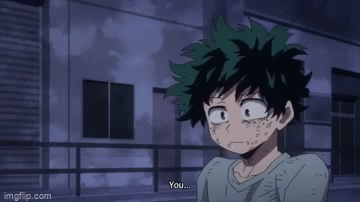
They just had a huge, emotional fistfight, and Katsuki… isn’t addressing him as an opponent, like he always has before. For once, he is addressing Izuku not as his enemy, but his equal.
This scene is the first time Katsuki properly grapples with the truth of their mutual weaknesses and comes to an understanding about it. It leaves him frustrated and unsure, but he walks away seeing himself and Izuku as being on the same side.
Because he takes All Might's words to heart: they are two halves of what makes a hero. They need to learn from each other and push each other to truly reach their best—as rivals, not enemies.
In chapter 322, Katsuki talks Izuku through how he felt about him all these years. He goes over all the things he's had to face to see how wrong he was, to see his own weakness and Izuku's strength. The whole time, he uses the "you" word he always has: temee.
But when it comes time to tell Izuku his true feelings, he calls Izuku by his given name, apologizes, and then right away he says this:
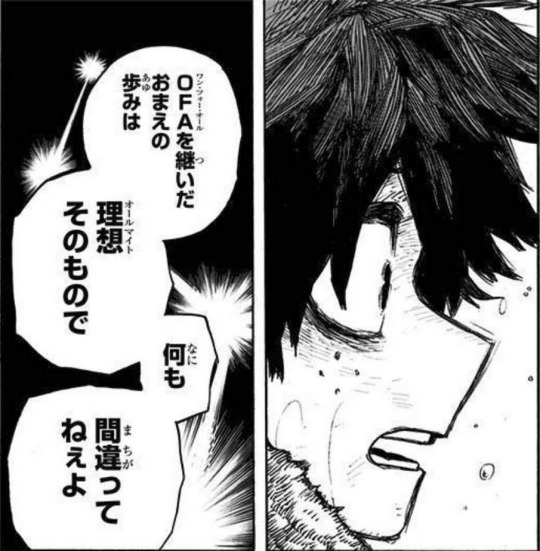
This is a direct call-back to the core question that Katsuki posed to Izuku during Deku vs. Kacchan 2: "Is my way of admiring All Might wrong?"
The second half to that question has always been, implicitly, "Does that mean yours is right?"
Here, Katsuki acknowledges Izuku fully as All Might's successor and affirms that Izuku's path is not wrong, using omae to tell him so. And then he uses it three more times to convince Izuku to come back with them and fight together, "because saving people is how we win."
To me, omae in this scene comes across with such softness. He's speaking with more humility than we've ever seen, both in what he's conveying and his word choice. (There is a whole other conversation to be had about Katsuki's word choice for "I'm sorry," but that is for a different time.)
This omae is not just a sign that he sees Izuku as his equal, it's expressing care for him. Katsuki sacrificed his life for Izuku, telling him, "Stop trying to win this on your own." He is trying so hard to make Izuku understand: Come back, I was wrong. Come back, I care about you.
Which brings us to the third time Katsuki uses omae: chapter 362.
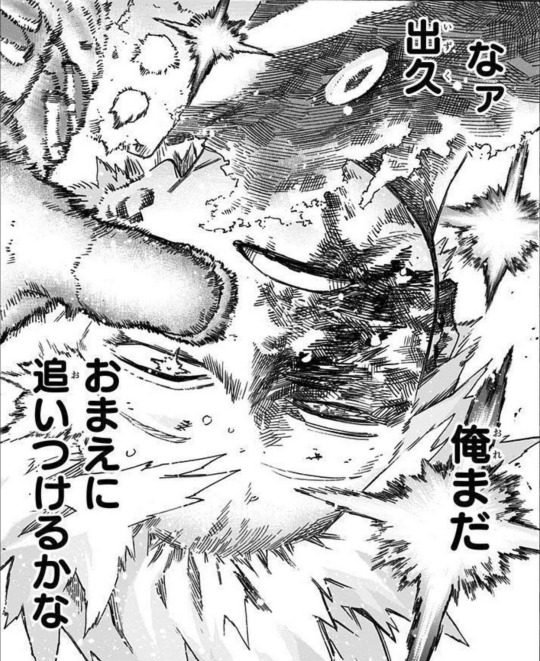
That's right, the infamous "Can I still catch up to you?" / "Can I still reach you?" line uses omae.
Here's the thing that's unique about this omae: it's in Katsuki's head. This is internal monologue; he isn't talking out loud to Izuku, he isn't trying to convey something to him face-to-face, he is just thinking about Izuku.
The word choice isn't for anyone else's benefit or any external purpose: this is just how Katsuki sees him.
I can't overstate how soft, vulnerable, and sincere this moment is for Katsuki. And what gets me about him thinking of Izuku as omae is, it makes me wonder, "How long has he thought of Izuku this way?"
When did Izuku stop being temee in his head?
Changing how you address someone is a big deal in Japanese. Whether it's a name or suffix change (Deku -> Izuku) or a pronoun change (temee -> omae), it represents a significant shift in the emotional dynamics of a relationship.
It crops up a lot in media as a dramatic moment of intimacy, sometimes even being a part of love confessions. This heightened drama is exactly what we see with Katsuki's apology when he calls him Izuku.
Katsuki addresses only Izuku with his given name and omae, and in the whole run of the series, he only uses omae in a few select instances. I would argue that this is really important, subtle character writing.
Looking at the scenes, at least to me, each omae reads as progressively more honest and intimate. Each time Katsuki uses it, he is reaching for Izuku. Each time, it means more.
#bkdk#bakudeku#dekubaku#dkbk#translations#mha spoilers#bnha spoilers#mha manga spoilers#bnha manga spoilers#bkdk apology#meta
3K notes
·
View notes
Text
He might as well have said I’m Kacchan “Sugoi” Midoriya bitch and you will refer to me as such that’s right I’m marrying him now you fucking asshole
#bnha 406#MHA 406#bnha spoilers#mha spoilers#bnha#mha#I cannot fucking believe this is happening#i love it so much#go back in time and tell him at any age that that will be his big badass like before saving the world I dare you#English translation better not screw this up istg I need this preserved in every language#bakudeku#bkdk#bakugou katsuki#katsuki bakugou#he will NEVER live this down (not that he’d want to but still omg)
671 notes
·
View notes
Text
MHA Chapter 406 spoilers translations
This week’s initial tentative super rough/literal translations under the cut.
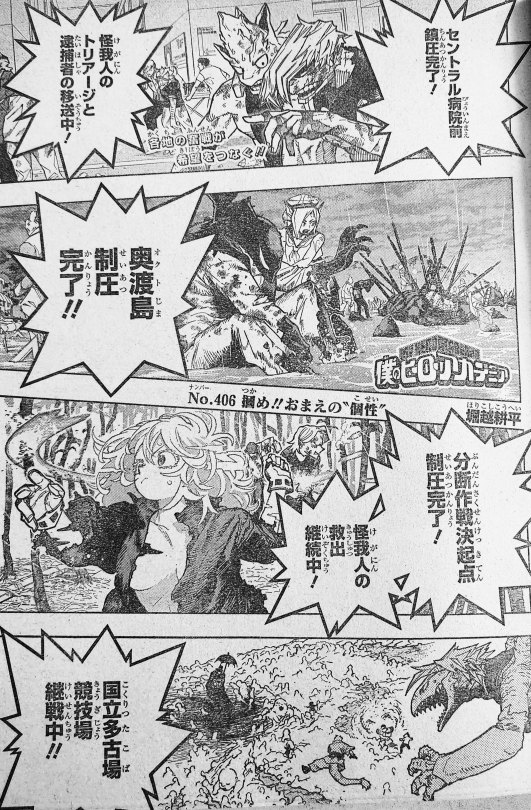
1
セントラル病院前鎮圧完了!
セントラルびょういんまえちんあつかんりょう!
SENTORARU byouin mae chin'atsu kanryou!
"Suppression in front of Central Hospital complete!"
tagline 1
各地の奮戦が希望をつなぐ‼︎
かくちのふんせんがきぼうをつなぐ‼︎
kakuchi no funsen ga kibou wo tsunagu!!
The struggles of various places connect hope!!
2
怪我人のトリアージと逮捕者の移送中!
けがにんのトリアージとたいほしゃのいそうちゅう!
keganin no TORIAAJI to taihosha no isouchuu!
"Triage of the injured and transport of the arrested in progress!"
3
奥渡島制圧完了‼︎
オクトじませいあつかんりょう‼︎
OKUTO-jima seiatsu kanryou!!
"Suppression at Octo Island complete!"
tagline 2
No.406 摑め‼︎おまえの"個性" 堀越耕平
ナンバー406 つかめ‼︎おまえの"こせい" ほりこしこうへい
NANBAA 406 tsukame!! omae no "kosei" Horikoshi Kouhei
No. 406 Grasp*!! Your quirk Kouhei Horikoshi
(*Note: This "grasp" can mean both to literally hold something and to comprehend/wrap one's head around something.)
4
分断作戦決起点制圧完了!
ぶんだんさくせんけっきてんせいあつかんりょう!
bundan sakusen kekkiten seiatsu kanryou!
"Suppression of the division strategy's starting point complete!"
5
怪我人の救出継続中!
けがにんのきゅうしゅつけいぞくちゅう!
keganin no kyuushutsu keizokuchuu!
"Continued rescue of injured persons in progress!"
6
国立多古場競技場継戦中‼︎
こくりつたこばきょうぎじょうけいせんちゅう‼︎
kokuritsu takoba kyougijou keisenchuu!!
"National Takoba Arena continued battle in progress!!"
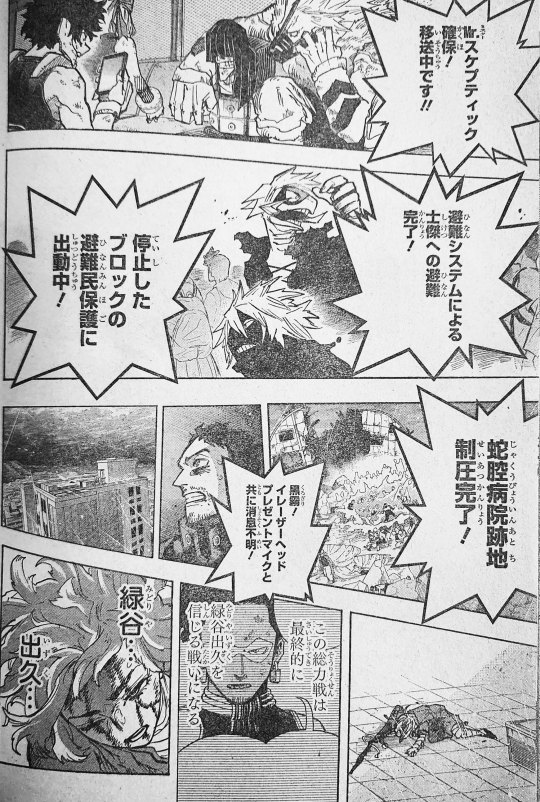
1
Mr.スケプティック確保!移送中です‼︎
ミスタースケプティックかくほ!いそうちゅうです‼︎
MISUTAA SUKEPUTIKKU kakuho! isouchuu desu!!
"Mr. Skeptic secured! His transfer is in progress!!"
2
避難システムによる士傑への避難完了!
ひなんシステムによるしけつへのひなんかんりょう!
hinan SHISUTEMU ni yoru shiketsu e no hinan kanryou!
"Evacuation to Shiketsu by way of evacuation system complete!"
3
停止したブロックの避難民保護に出動中!
ていししたブロックのひなんみんほごにしゅつどうちゅう!
teishi shita BUROKKU no hinanmin hogo ni shutsudouchuu!
"Dispatch to protect the evacuees of the stopped blocks in progress!"
4
蛇腔病院跡地制圧完了!
じゃくうびょういんあとちせいあつかんりょう!
jakuu byouin atochi seiatsu kanryou!
"Suppression of the ruins at Jakuu Hospital complete!"
5
黒霧!イレーザーヘッドとプレゼントマイクと共に消息不明!
くろぎり!イレーザーヘッドとプレゼントマイクとともにしょうそくふめい!
Kurogiri! IREEZAA HEDDO to PURESENTO MAIKU to tomo ni shousoku fumei!
"Kurogiri! And Eraser Head and Present Mic with him, whereabouts unknown!"
6
この総力戦は最終的に
このそうりょくせんはさいしゅうてきに
kono souryokusen wa saishuuteki ni
This all-out war will eventually
7
緑谷出久を信じる戦いになる
みどりやいずくをしんじるたたかいになる
Midoriya Izuku wo shinjiru tatakai ni naru
become a battle of believing in Izuku Midoriya.
(Note: As per what I wrote in chapter 379, I would probably contextually read lines 6-7 as something like “This all-out war will come down to us trusting in Izuku Midoriya.”)
8
緑谷…
みどりや…
Midoriya...
Midoriya...
9
出久…
いずく…
Izuku...
Izuku...
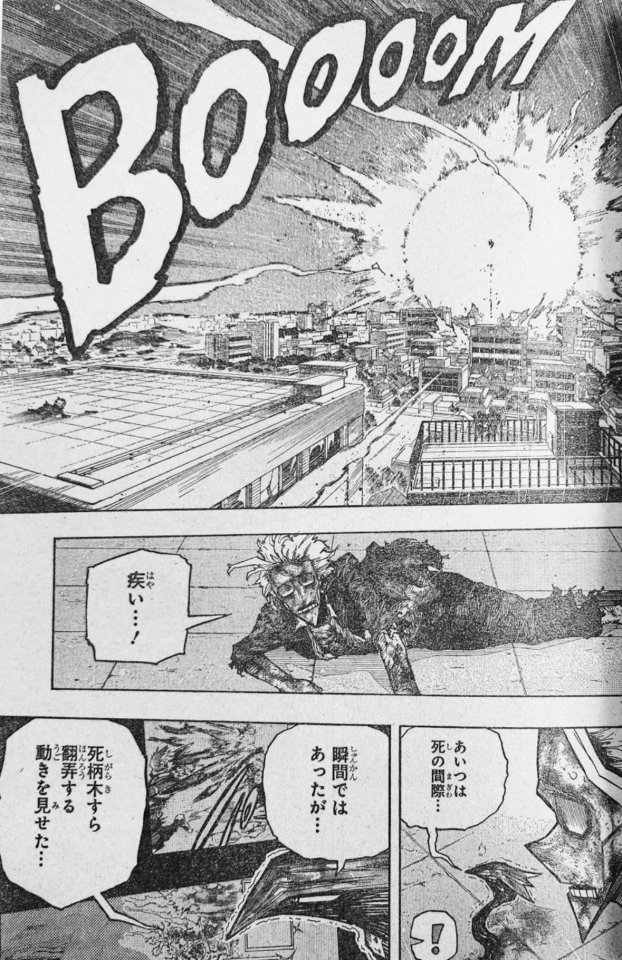
1
疾い…!
はやい…!
hayai...!
"[So] fast...!"
2
あいつは死の間際…
あいつはしのまぎわ…
aitsu wa shi no magiwa...
"That guy was on the verge of death..."
3
瞬間ではあったが…
しゅんかんではあったが…
shunkan de wa atta ga...
"It was [for just] a moment, but..."
4
死柄木すら翻弄する動きを見せた…
しがらきすらほんろうするうごきをみせた…
Shigaraki sura honrou suru ugoki wo miseta...
"He showed movement that made sport of even Shigaraki..."
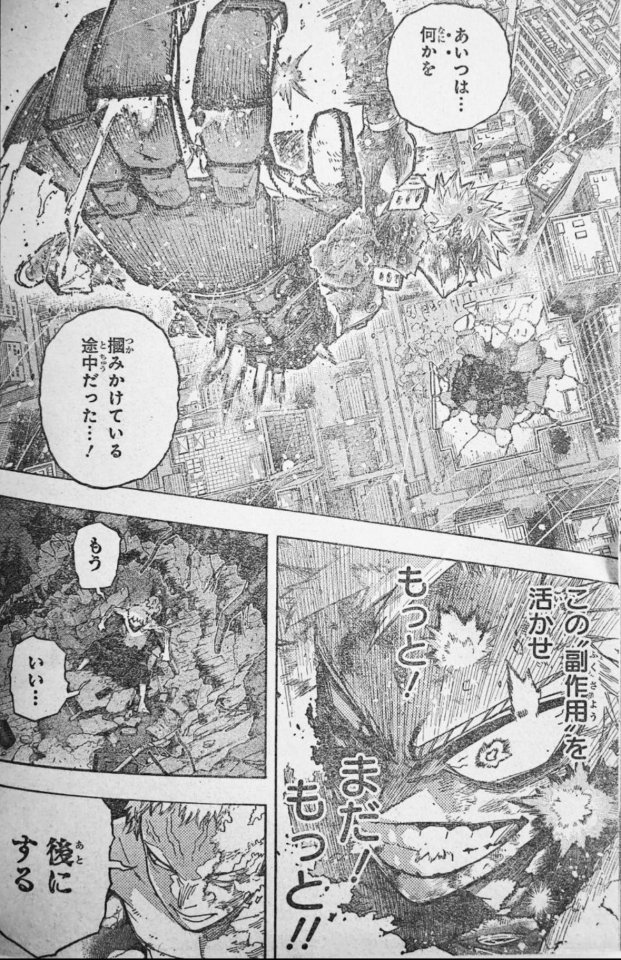
1-2
あいつは何かを摑みかけている途中だった…!
あいつはなにかをつかみかけているとちゅうだった…!
aitsu wa nani ka wo tsukami kakate iru tochuu datta...!
"He was in the middle of grasping* something...!"
(*Note: Again, this is that word that means "grasp" and "comprehend.")
3
この"副作用"を活かせ
この"ふくさよう"をいかせ
kono "fukusayou" wo ikase
Take advantage of this "side effect"
4
もっと!
motto!
more!
5
まだ!もっと‼︎
mada! motto!!
Still! More!!
6-7
もういい…
mou ii...
"Enough..."
8
後にする
あとにする
ato ni suru
"Leave him for later."
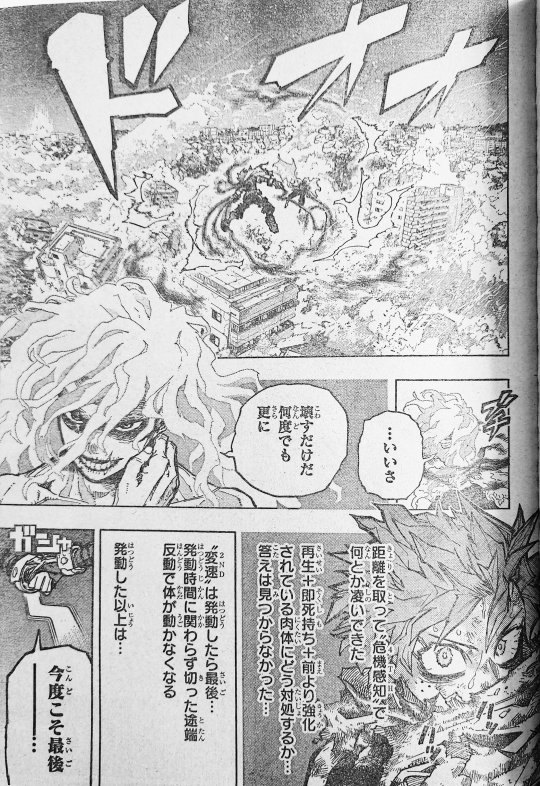
1
…いいさ
...ii sa
"...It's fine."
2
壊すだけだ何度でも更に
こわすだけだなんどでもさらに
kowasu dake da nando demo sara ni
"I'll just break him however many more times even further."
3
距離を取って"危機感知"で何とか凌いできた
きょりをとって"4TH"でなんとかしのいできた
kyori wo totte "4TH (kanji: kiki kanchi)" de nan toka shinoi dekita
I started to somehow pull through by keeping my distance with the "4th (read as: Danger Sense)."
4
再生+即死持ち+前より強化されている肉体にどう対処するか…答えは見つからなかった…
さいせい+そくしもち+まえよりきょうかされているにくたいにどうたいしょするか…こたえはみつからなかった…
saisei + sokushi mochi + mae yori kyouka sarete iru nikutai ni dou taisho suru ka...kotae wa mitsukaranakatta...
As for how to deal with his regeneration + instant death[-inflicting ability] + his body strengthened more than it was before...I couldn't find an answer...
5
"変速"は発動したら最後…発動時間に関わらず切った途端反動で体が動かなくなる
"2ND"ははつどうしたらさいご…はつどうじかんにかかわらずきったとたんはんどうでからだがうごかなくなる
"2ND (kanji: hensoku)" wa hatsudou shitara saigo...hatsudou jikan ni kakawarazu kitta totan handou de karada ga ugokanaku naru
If I activate the "2nd (read as: Gear Shift)," it'll be the last time... Regardless of the time for which it's activated, as soon as it's turned off, my body will stop moving due to the immediate recoil.
6
発動した以上は…
はつどうしたいじょうは…
hatsudou shita ijou wa...
Now that I've activated it...
7
今度こそ最後ーーー…
こんどこそさいごーーー…
kondo koso saigo---...
"This time is the last---..."
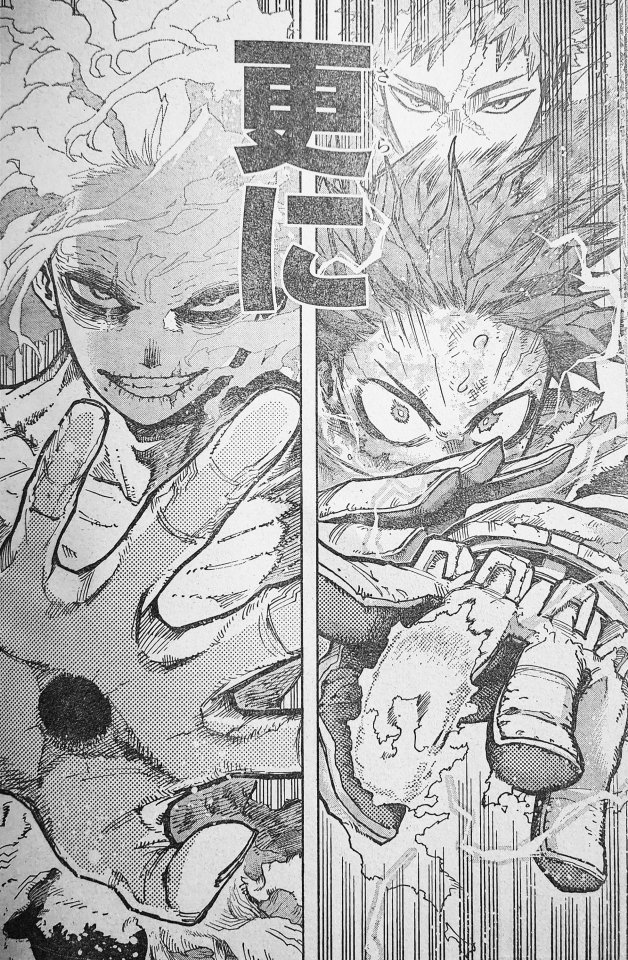
1
更に
さらに
sara ni
Go
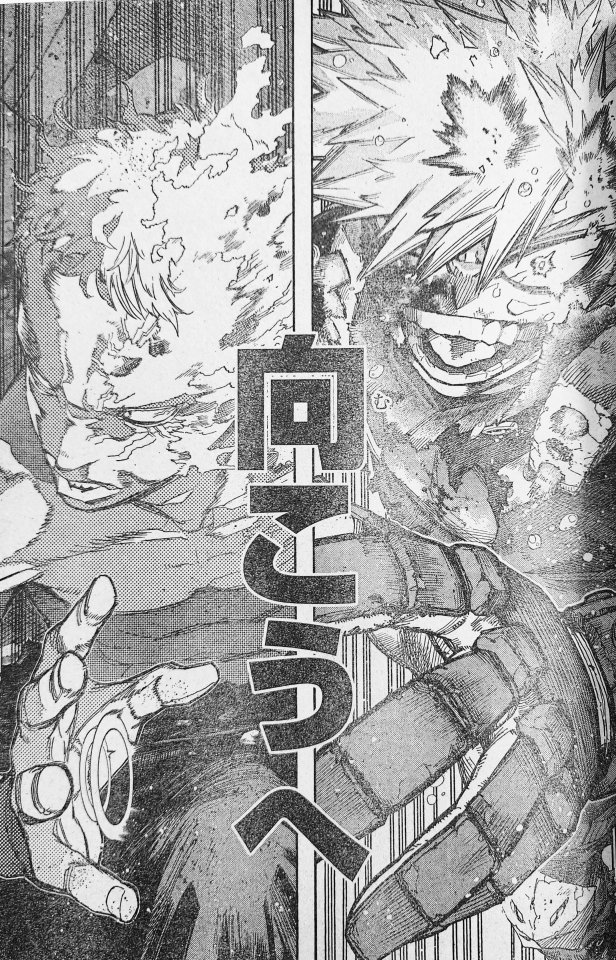
1
向こうへ
むこうへ
mukou e
beyond
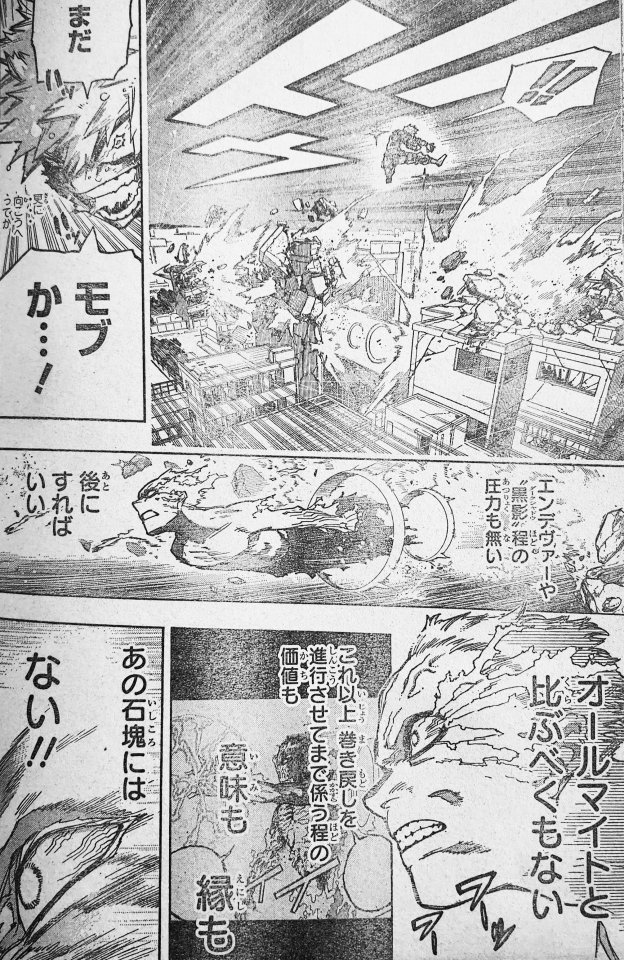
1
まだ
mada
"Am I still"
small text
更に向こうへってか
さらにむこうへってか
sara ni mukou e tte ka
"[They] say 'Go beyond,' right?"
2
モブか…!
MOBU ka...!
"an extra...?!"
3
エンデヴァーや"黒影"程の圧力も無い
エンデヴァーや"ダークシャドウ"ほどのあつりょくもない
ENDEVAA ya "DAAKU SHADOU" hodo no atsuryoku mo nai
It's not as much pressure as with those like Endeavor and Dark Shadow.
4
後にすればいい
あとにすればいい
ato ni sureba ii
It's fine to leave him for later.
5
オールマイトと比ぶべくもない
オールマイトとくらぶべくもない
OORU MAITO to kurabu beku mo nai
He can't compare to All Might.
6
これ以上 巻き戻しを進行させてまで係う程の価値も
これいじょう まきもどしをしんこうさせてまでかかずらうほどのかちも
kore ijou makimodoshi wo shinkou sasete made kakazurau hodo no kachi mo
To let the rewind proceed more than this, there's no value
7
意味も
いみも
imi mo
nor meaning
8
縁も
えにしも
nor connection*
(*Note: This is the same word All Might uses in chapter 396 to refer to a connection between him and Dave in the USA; it's a word that refers to some mysterious force such as destiny that binds two people together.)
9-10
あの石塊にはない
あのいしころにはない
ano ishikoro ni wa nai!!
in it with that pebble!!
(Note: For speech bubbles 6-10, you could combine them all together into something more cohesive like this: "There's no value or meaning or connection with that pebble to merit letting him rewind me any more than this!!" And yes, Katsuki is the "pebble," which is a reference back to chapter 7 when Katsuki called Izuku a "pebble in his path.")
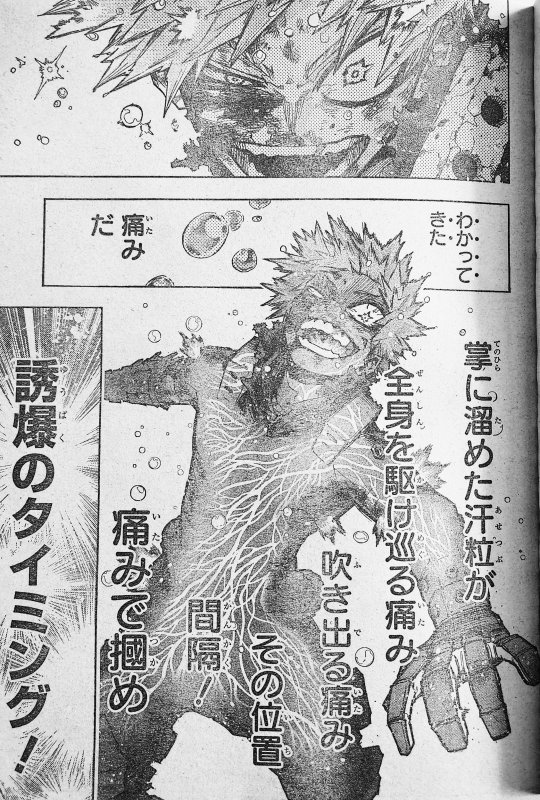
1
わかってきた
wakatte kita
I've come to understand.
2
痛みだ
いたみだ
itami da
It's pain.
3
掌に溜めた汗粒が
てのひらにためたあせつぶが
tenohira ni tameta asetsubu ga
[The pain of] the beads of sweat that collected on my palms
4
全身を駆け巡ぐる痛み
ぜんしんをかけめぐるいたみ
zenshin wo kakemeguru itami
running through my entire body,
5
吹き出る痛み
ふきでるいたみ
fukideru itami
pain that spouts* out,
(Note: This word to describe the pain can mean: "gush out, spout out, spurt out" but it can also mean "send out shoots" like for plant roots. I feel like that description is relevant given the imagery we see on this page. Considering the next line, I think he's referring to pain that erupts from different individual points on his body.)
6-7
その位置間隔!
そのいちかんかく!
sono ichi kankaku!
and the space between those positions!
(Note: He's talking about recognizing the physical space between the different points of pain on his body.)
8
痛みで摑め
いたみでつかめ
itami de tsukame
Grasp* it with pain,
(Note: Again, this is that word that means "grasp" in the sense of "comprehend.")
9
誘爆のタイミング!
ゆうばくのタイミング!
yuubaku no TAIMINGU!
the timing of the secondary explosions!
(Note: I think he's saying he can predict when and where the little explosions that surround his body will happen by paying attention to the locations of the pains on his body and thus he can utilize those explosions too.)
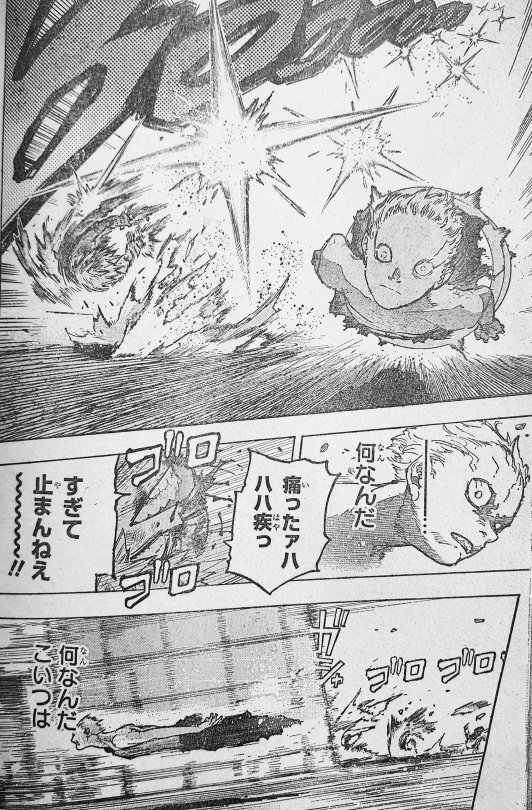
1
何なんだ
なんなんだ
nan nanda
What is this?
2
痛ったァハハハ疾っ
いったァハハ��はやっ
ittaAHAHAHA haya
"It hurts-A-HAHAHA so fast!"
(Note: Yes, he's breaking into maniacal laughter at the end of his words. Also a fun phonetic bonus: the Japanese word for "so fast" here is "haya," so he's saying "hahaha-haya!" He sounds battle-crazy, or just plain crazy.)
3
すぎて止まんねえ〜〜〜‼︎
すぎてやまんねえ〜〜〜‼︎
sugite yamannee~~~!!
"Too fast, can't sto~o~o~p!!"
4
何なんだこいつは
なんなんだこいつは
nan nanda koitsu wa
What's with this guy?
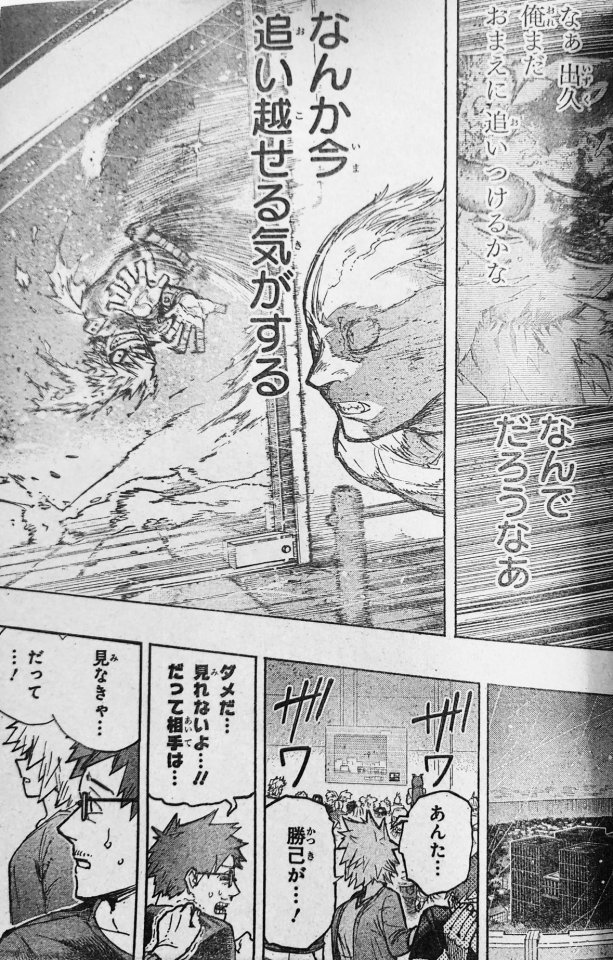
1
なぁ 出久 俺まだおまえに追いつけるかな
なぁ いずく おれまだおまえにおいつけるかな
naa Izuku ore mada omai ni oitsukeru ka na
Hey, Izuku, can I still catch up to you?
2
なんでだろうなあ
nande darou naa
I wonder why?
3
なんか今追い越せる気がする
なんかいまおいこせるきがする
nanka ima oikoseru ki ga suru
I feel like I can surpass [you] now.
4
あんた…
anta...
"Honey..."
5
勝己が…!
かつきが…!
Katsuki ga...!
"Katsuki is...!"
6
ダメだ…見れないよ…‼︎だって相手は…
ダメだ…みれないよ…‼︎だってあいては…
DAME da...mirenai yo...!! datte aite wa...
"No...I can't watch...!! Because his opponent is..."
7
見なきゃ…
みなきゃ…
minakya...
"We have to watch..."
8
だって…!
datte...!
"because...!"
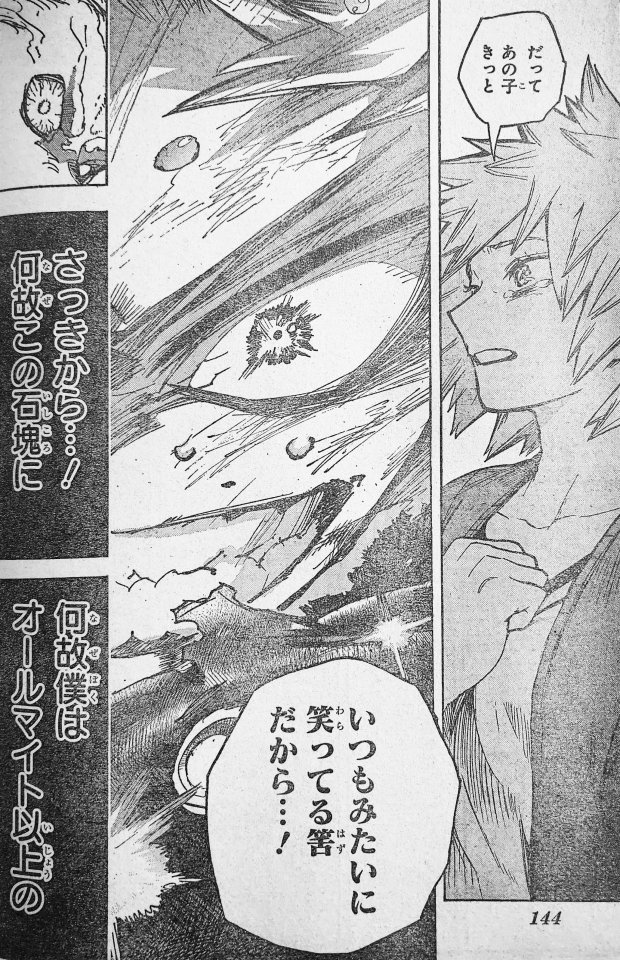
1
だってあの子きっと
だってあのこきっと
datte ano ko kitto
"Because that child is surely"
2
いつもみたいに笑ってる筈だから…!
いつもみたいにわらってるはずだから…!
itsumo mitai ni waratteru hazu dakara...!
"smiling like he always does...!"
3
さっきから…!何故この石塊に
さっきから…!なぜこのいしころに
sakki kara...! naze kono ishikoro ni
Since a while ago...! Why is this pebble...?
4
何故僕はオールマイト以上の
なぜぼくはオールマイトいじょうの
naze boku wa OORU MAITO ijou no
Why am I...even more than with All Might...?
(Note: The verb at the end of the sentence is cut off here making this sound awkward in English. He's basically wondering how Katsuki is irritating him even more than All Might did.)
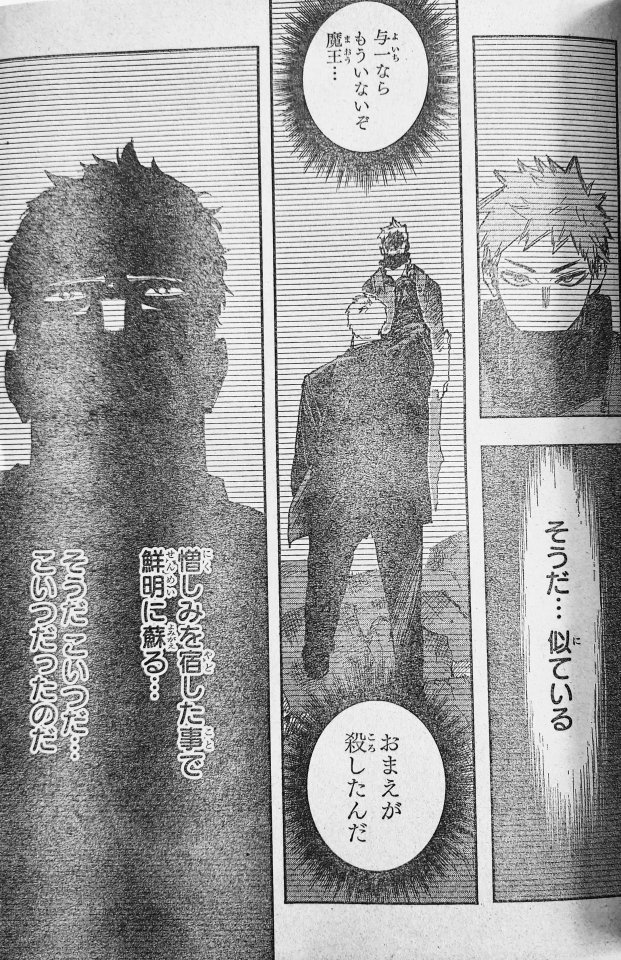
1
そうだ… 似ている
そうだ… にている
sou da...nite iru
That's it...he resembles [that guy].
2
与一ならもういないぞ魔王…
よいちならもういないぞまおう…
Yoichi nara mou inai zo maou...
If it's Yoichi [you're looking for], he's already gone, Demon King...
3
おまえが殺したんだ
おまえがころしたんだ
omae ga koroshitanda
Because you killed him.
4
憎しみを宿した事で鮮明に蘇る…
にくしみをやどしたことでせんめいによみがえる…
nikushimi wo yadoshita koto de senmei ni yomigaeru...
By harboring hatred, I recall it clearly...
5
そうだ こいつだ…こいつだったのだ
sou da koitsu da...koitsu datta no da
That's it, it's this guy... It was this guy.
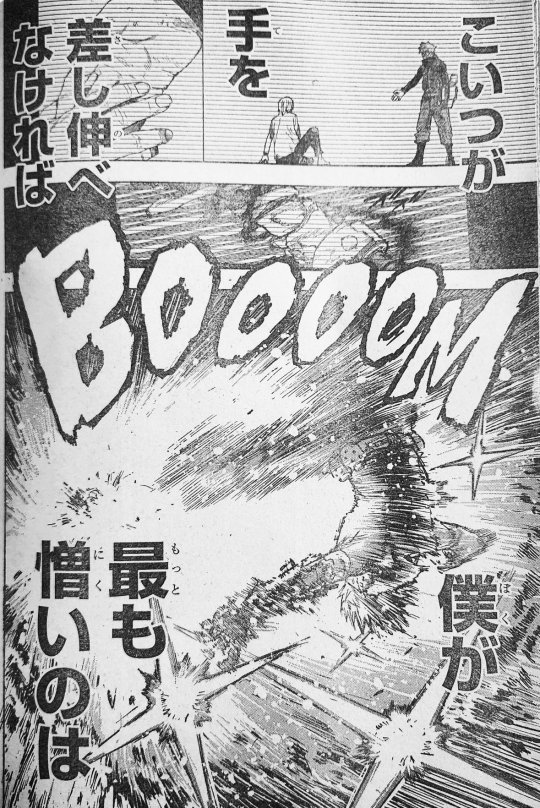
1-3
こいつが手を差し伸べなければ
こいつがてをさしのべなければ
koitsu ga te wo sashinobenakereba
If this guy hadn't reached out his hand...
4-5
僕が最も憎いのは
ぼくがもっともにくいのは
boku ga motto mo nikui no wa
What I hate most of all is...
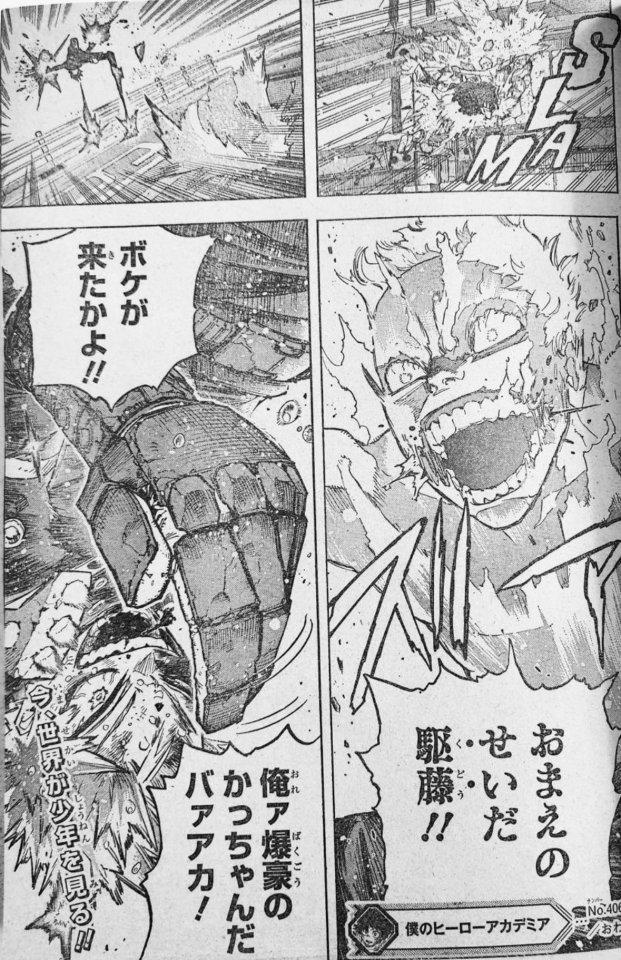
1
おまえのせいだ駆藤‼︎
おまえのせいだくどう‼︎
omae no sei da Kudou!!
"It's because of you, Kudou!!"
(Note: Because of the order of words in Japanese, you can also read this like the end to the last sentence on the previous page: "What I hate most of all is YOU [Kudou].")
2
ボケが来たかよ‼︎
ボケがきたかよ‼︎
BOKE ga kita ka yo!!
"So an old geezer is here!!"
(Note: This is the same grammar as All Might's "I am here!")
3
俺ァ爆豪のかっちゃんだバァアカ!
おれァばくごうのかっちゃんだバァアカ!
oreA Bakugou no Kacchan da BAAAKA!
"I'm Kacchan of the Bakugou clan*, moron!"
(*Note: "Bakugou no Kacchan" literally means "Kacchan of Bakugou/Kacchan of the Bakugous," but the grammar is an archaic style from before Japan's family registration system created family names in the late 1800's. The structure would read as "[Name] of the [clan name]." The literal word "clan" does not appear in the sentence above, but I've included it to get the archaic style to make sense in English. I should also mention that it's possible Katsuki is introducing himself here as "Kacchan" as an insult to AFO's intelligence. Like, "Oh you're a little kid/senile old man? My real name's probably too difficult for you. Here, call me Kacchan, dumbass.")
tagline
今、世界が少年を見る‼︎
いま、せかいがしょうねんをみる‼︎
ima, sekai ga shounen wo miru!!
Now, the world sees the young man!!
#my hero academia leak translations#mha 406#bnha 406#my hero academia manga spoilers#final arc spoilers#kacchan of the bakugous#that one anime trope where the hero goes mad with power or something and goes so off the rails the villain freaks the fuck out#there are a LOT of notes this chapter too
493 notes
·
View notes
Text
Feitan Head Cannon
Feitan does not like giving out compliments. So much so that you've grown used to the smart ass remarks and little insults wat he would throw wat you. At this point you find them to be terms of endearment. But there are times in the quiet moments when he'll tell you little things in his first language. Knowing that you won't understand what he's saying, he'll whisper compliments to you and watch your nose scrunch up in confusion as you pester him to tell you what he said.
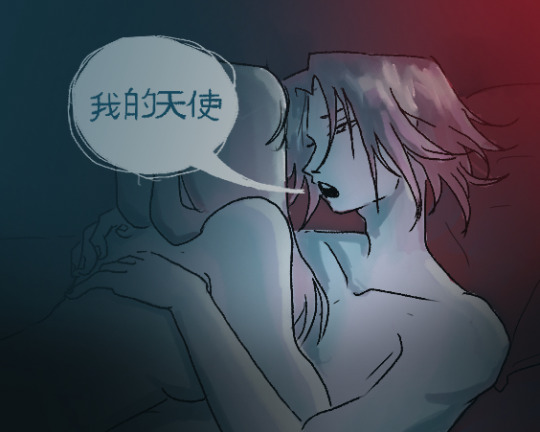
#feitan#feitan hxh#feitan porter x reader#feitan x reader#headcanon#x reader#bnha#my art#The text is supposed to translate to 'My Angel's in Chinese#If I wrote it wrong please tell me#Chinese is supposed to be Feitan's first language in the manga I believe
192 notes
·
View notes
Text
hmmm i think tomura will heal izuku. This chapter brought attention to the “reconstruction” aspect of Tomura’s decay and I feel like that’s foreshadowing. It’s also just symbolic of Tomura’s heart as a whole so it makes sense trust
#i know there’s a bunch of chisaki alarms going off right now but I want to read the actual translations before thinking about. any of that#lmao#bnha 419#bnha spoilers#bnha leaks
246 notes
·
View notes
Text
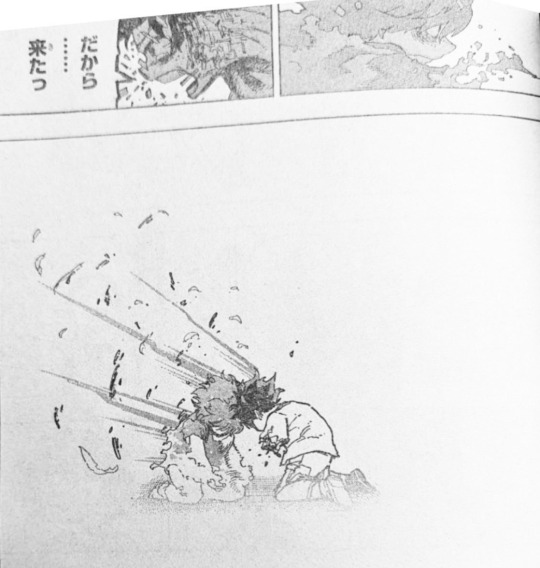

I am so fucking happy this is where Deku gets his "I am here" moment.
Thank you Horikoshi.
#i knew this was going to be where it happened#while saving shigaraki in his own way#izuku midoriya#tomura shigaraki#tenko shimura#mha 418#bnha 418#bnha spoilers#mha spoilers#credit to pikahula for the translation
289 notes
·
View notes
Text
DadMight Speak Amplifier 🔊
BNHA Ch. 396 Spoilers

All Might: “The only person who’s been able to prove you wrong is Midoriya My Boy, Nighteye. So I’m emulating him because fuck your dreams, fuck your nightmares, and fuck your stupid prophecies. I’M GONNA LIVE.”
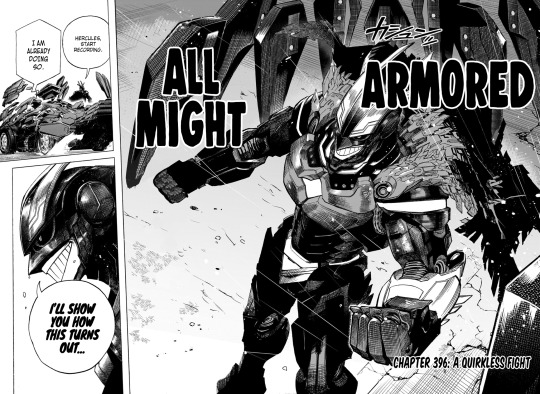
All Might: “Fufufu, I can’t wait to show Young Midoriya how I defeated All For One and won again! Hercules, make sure you capture everything in eight different angles. My boy needs several copies of my win from various perspectives, you hear me?!”

Tsukauchi: “FFS. For ONCE IN YOUR LIFE, can you be sane when it comes to Midoriya?”
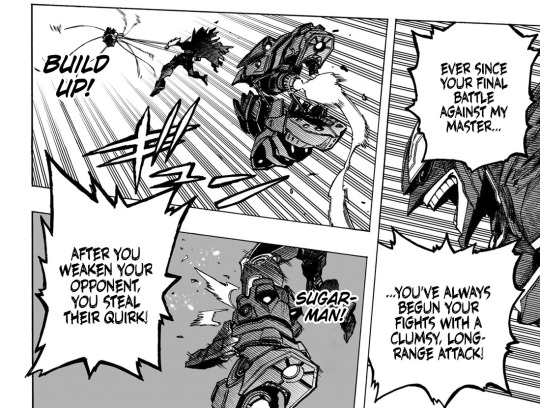
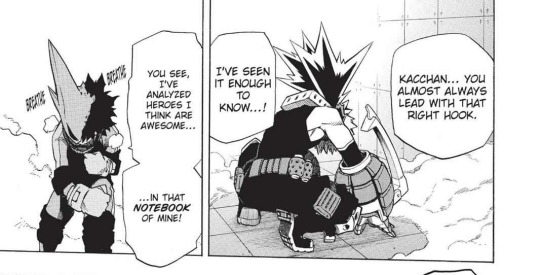
Please appreciate the All Might and Izuku parallels of pointing out how their opponent leads with the same ol’ predictable attack that’s been used to torment them for years.

All Might: “I made a Very Important Promise and my god am I gonna goddamn keep it.”

*reserves his son’s move for the actual Smash attack*
#dadmight#yagi toshinori#bnha#midoriya izuku#bnha manga spoilers#stealing Gentry’s DFO translator format
712 notes
·
View notes
Text


Weekly vs Volume - they corrected "You'll never make a damn thing of yourself" to "You'll never amount to anything at all!"
49 notes
·
View notes
Text
{English vs. Japanese Translation Comparison for Spinner’s Speech to Toga (288) w/ Commentary}
Lately I’ve been revisiting League of Villains scenes from past chapters and translating them to distract myself from life being chaotic and emotionally abusive. Below, you’ll find the product of one of my many sleepless nights.

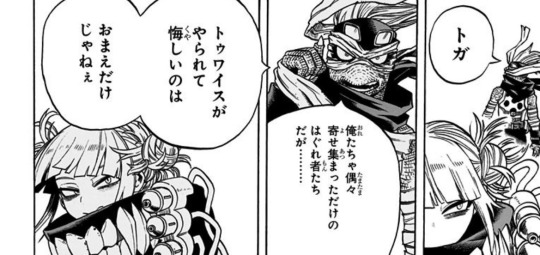
「トガ俺たちゃ偶々寄せ集まっただけのはぐれ者たちだが.........」
= “Toga, we are stray people who only met / came together / assembled by chance.........”
はぐれ / 逸れる (romaji: hagureru) means “to become separated from (e.g., one’s companions); to lose sight of; to go astray (as in off course); to wander; to become lost; to veer away; to deviate.” Essentially, it describes the situation of finding oneself alone and disconnected from self or others.
Are you familiar with the Parable of the Lost Sheep? I grew up reflecting on it, even though I’m not Christian and was not raised in a Christian household (the same allegory exists in other Abrahamic traditions as well). This next bit of exposition will borrow heavily from the analogy of the lost sheep, shepherd, and flock of ninety nine WITHOUT the religious overtones. For reference, I have included a screenshot of the Parable of the Lost Sheep as it appears in the Gospel of Luke.

Spinner is likening each of the League of Villains members to the one sheep that strays from the flock and then must contend with the harsh reality that on its own it is not likely to survive for long before it is discovered by hungry predators, suffers an injury, starves, or falls ill and dies. And yet, it cannot be assured that the shepherd, upon realizing one of his sheep has gone astray, will break from the flock (“All”), leaving the ninety nine, for the sake of searching for the wayward sheep (“One”).
This is an example of utilitarianism versus deontology in action. A utilitarian, like Hawks, would favor abandoning the missing sheep (“One”), effectively sacrificing its life, so that the shepherd remains with the flock (“All”), prioritizing the greatest *number* of sheep over the welfare of each *individual* sheep. Utilitarianism and its proponents measure the “rightness” or “wrongness” of an action by the “sum of utilities” (i.e., usefulness, results) produced rather than by considerations of beneficence, fairness, and justice. To a utilitarian, sacrificing one to save many is the “morally correct” thing to do—and therefore the “right” choice—because it would seem to benefit the *most* people (99 > 1), even if and when actions taken do direct or indirect harm to *some* people (the one sheep that had become separated from the flock and, under utilitarianism, would be abandoned by the shepherd to die). To a deontologist like Jin, however, abandoning the one for the purported sake of the many would be unthinkable, immoral, and unethical. Who is Hawks to decide for the missing sheep that its life has less value and importance than the lives of the remaining ninety nine sheep, who, unlike the one, have the benefit of the flock’s protection, even in absence of the shepherd? It would be harder for a predator to isolate and take down an integrated member of the flock than it would be to kill and devour the already isolated and defenseless sheep that strayed. A deontologist like Jin would argue that if it would be wrong to abandon the ninety nine, then it also would be wrong to abandon the one, because abandoning anyone is wrong. Wrong is wrong is wrong, regardless of circumstances. A utilitarian like Hawks would argue that it would not be cost effective to risk harm coming to the ninety nine for the sake of the one. A single sheep lost is a loss (in a similar vein to how being rained out of a highly anticipated football game is a loss), but it is a negligible one compared to the loss of five, ten, or ninety nine, which would cripple the shepherd’s profits and could cost him his livelihood. (Jin would sucker-punch Hawks in the jaw for running a cost-benefit analysis on LIVES). Where do you think that old adage “do unto others as you would have others do unto you” would fall between these two ethical perspectives? If you guessed deontology, you were right. “Treat others as you would like to be treated” is a deontological principle.
Circling back to Spinner comparing the main members of the League of Villains to sheep without a flock, he follows up his description of himself and the others as “stray people” by implying that they became for one another that which they had lost (or never had): a flock to return to, share experiences with, and find comfort, protection, and companionship in. When they first became estranged from their respective flocks, assuming they had ever had such a thing (I’m not convinced Spinner had ever had a “flock” before the League of Villains), they had no way of knowing they would ever belong to another (flock, that is, not person; people don’t own people). They could not have known they would not always be alone and wandering, hoping to avoid predators, struggling to survive without material resources or supports of any kind. After all, their assembling as the League of Villains when and how they did was random. They each had their reasons for joining the group and a few (Magne, Jin) might have even had “friendship, belonging” as one of their motivations for joining, but others (Tomura, Touya, Himiko, Spinner, Atsuhiro) were certainly not expecting to bond and develop close friendships with their comrades in arms turned found family.
“You’re not the only one devastated by Twice being killed.”
やられて means (romaji: yara rete) “to hit; to harm; to injure; to kill.” This is the action done to the sentence subject (トゥワイス : Twice). 悔しい (romaji: kuyashii) has several potential meanings, including “frustrated (over a failure, humiliation, or injustice); annoyed; chagrined; (bitterly) disappointed; bitter; vexed; regretful; sorrowful.” I tried to brainstorm for an English word that could carry the nuance of all or most of these definitions. I settled for “devastated.” To devastate is to “destroy or ruin (something)” or “cause (someone) severe and overwhelming shock or grief.” I’d say that description fits, particularly for Dabi and Toga, who had extreme negative reactions to Twice’s murder and were shown to still be grappling with the traumatic loss almost 100 chapters later in No.341.
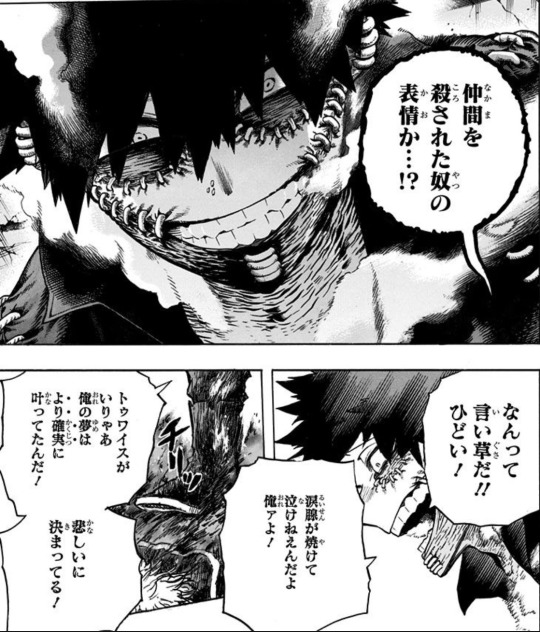
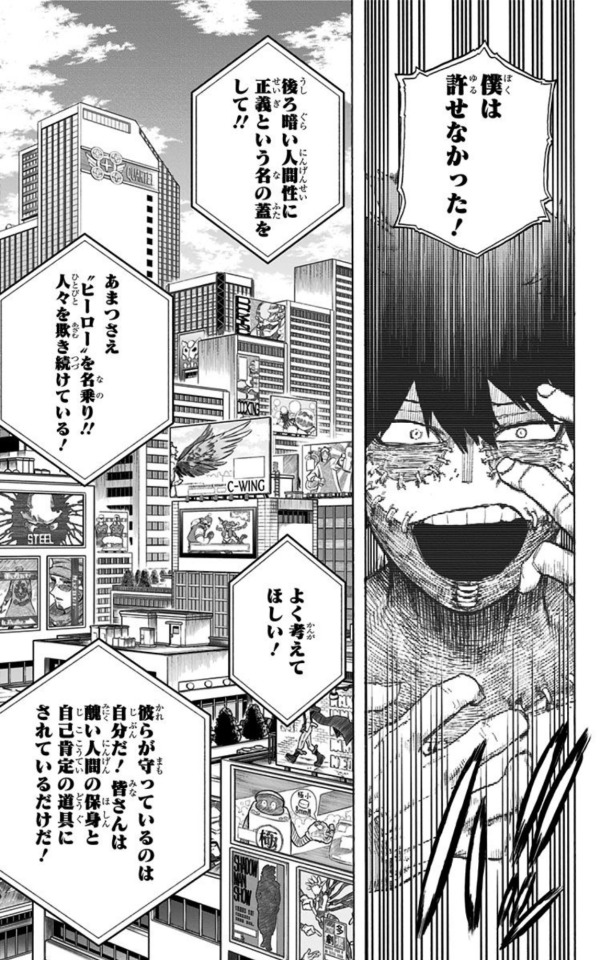

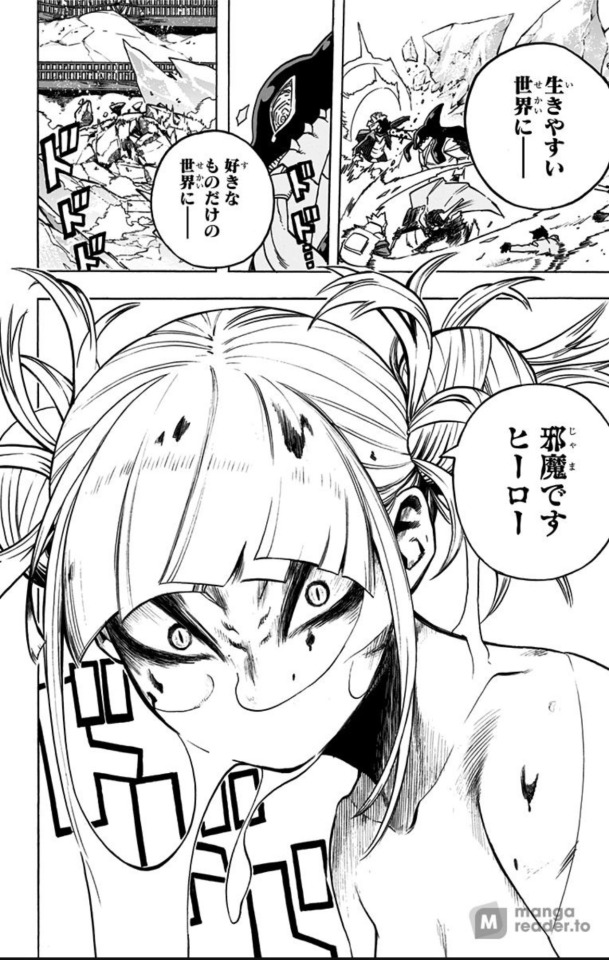
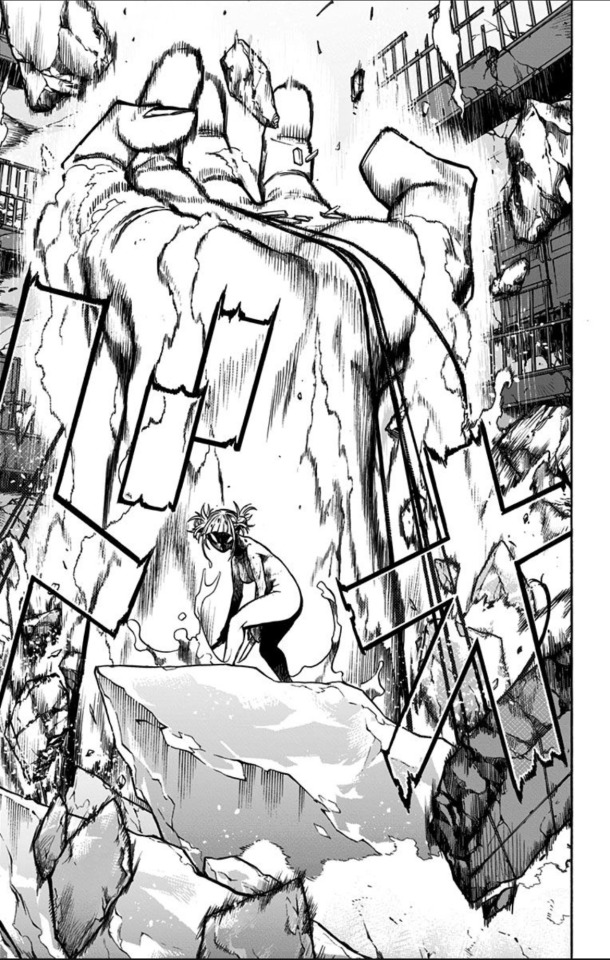
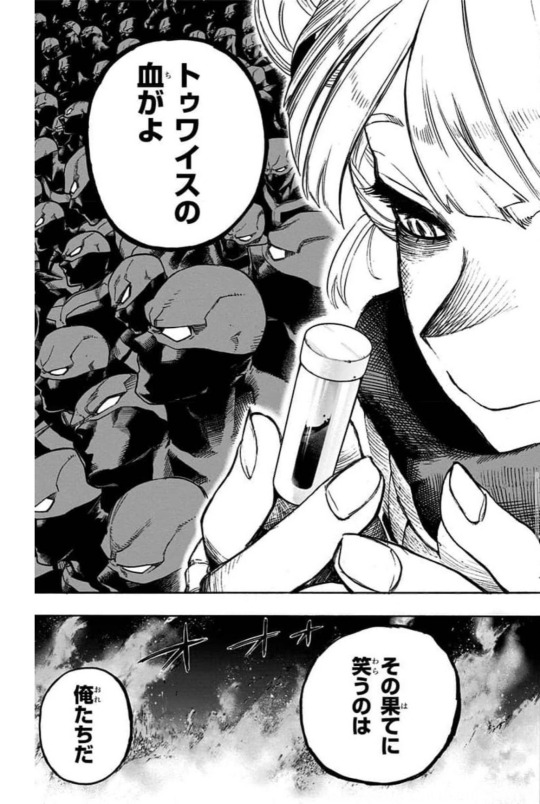

“You’re not the only one devastated by Twice being killed” became “you’re not the only one feeling messed up... over Twice” in the official English translation, which not only greatly understates the intensity of the League of Villains' feelings about their friend’s (and Himiko's older brother's) death but also conveniently omits that Spinner was explicit about Twice’s fate. He was murdered, and Spinner did not tiptoe around that fact. Spinner's ability to verbalize what happened to Twice suggests that he is not in denial about it but that it is weighing heavily on his mind and heart, enough to have prompted him to call out to Toga when he saw her preparing to run off in pursuit of Heroes, Heroes like the Hero who killed Twice.
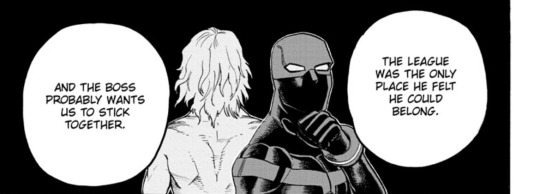

「敵連合はあいつにとって唯一の居場所で」
= “For him (Twice), the League of Villains was the only place he belonged / fit in / could be himself” or “As far as he (Twice) was concerned, the League of Villains was the only place he belonged / fit in / could be himself.”
The difference between the official English translation and direct Japanese to English translation might seem superficial at first glance, but at least in my mind, there is an important distinction to be made between them. Caleb had Spinner say that Twice “FELT” he “COULD” belong with the League of Villains, but “could” implies potential more than it does reality. Twice “COULD” belong with the League of Villains, or he *COULD NOT* belong with them. It “COULD” rain on Sunday, but it also *COULD NOT* rain on Sunday.
In Japanese Spinner doesn’t say “Twice FELT he COULD belong”; he says “Twice DID belong / fit in / could be himself.” For Twice, reality was that he had found in the League of Villains the unconditional acceptance, positive regard, and camaraderie he had searched for, empty-handed and broken-hearted, his entire life. The sole “condition” for Twice to “belong” and “fit in” with the League of Villains was simply for him to be himself. He didn’t even have to be “useful” to be accepted. Originally, Twice refused to use Double to its full capability because he was afraid of himself, afraid of losing control, afraid of disappearing, afraid of dying. Even though he had joined a fledgling crime syndicate and then plainly stated he was unwilling to contribute his “material” best to their cause, Twice was not shamed for it. He was not faulted for it. His feelings, his needs, and his boundaries were immediately and unequivocally respected by everyone. HIS best was enough for them even when it was not THE best. Who he naturally was was enough for the League of Villains. That’s what Hawks refused to hear (literally, he wasn’t listening) and failed to understand. He used Twice to gather intelligence on the League of Villains while undercover at the PLF mansion but never saw any of them for the complex, deeply wounded, but not unfeeling or compassionless individuals Twice knew them to be. Hawks saw “two-bit criminals” at best and “evil, demonic, abnormally depraved, subhuman” monsters at worst. He does not and will not or is unable to recognize the humanity in them that Twice saw.
At the end of the day, Hawks has proven that it is easier for him to ruthlessly mock and murder criminals than it is for him to listen to understand and actually help them. He’s quicker to kill than to empathize. Recognizing and respecting the humanity of others requires one to recognize and respect their own. Hawks’ actions demonstrate that he would kill adult “Keigo” before he would extend a hand to help him. Only a person willing to kill the humanity inside of themselves could have killed Jin, whose narrative purpose, as flagged by Horikoshi’s choice of his name and kanji, was to be a stand-in and representative for humanity, its duality, and the everyman. Hawks killed “Keigo” to kill “Jin.” Horikoshi even illustrates that point for us in No.264 by positioning the bottom panels to have Hawks’ feather blades, sharp and poised to strike, directed at HIM as he slaughters DOZENS of Twice clones, each one representing the same thing: humanity, its duality, and the everyman. Hawks killed Jin again and again and again and again... and every time he did, he killed part of himself, the part that makes him human.

But let’s not mince words here. While that moralistic, cutthroat, sacrifice-anyone-to-save-everyone attitude *hurts* Hawks, it *kills* people like Twice, and hurting isn't killing. (Yes, the HPSC instilled it in him and Keigo is a victim as well, but no, that does not mitigate the damage he, who is now an adult with the ability to make decisions for himself about how to behave and has long had the financial resources required to seek professional help, CHOOSES to inflict on others.) Hawks walks away from these encounters unfettered, without personal or professional consequence, and with his life, dreams, and opportunity to grow and heal intact, while the people he kills have their lives, dreams, and opportunities to grow and heal stolen from them by his hand. (Realistically, Twice was NOT Hawks’ first kill. Make no mistake, Hawks is an assassin for the HPSC. The “act” is being a cheerful, lackadaisical young man, NOT being a sanctimonious, remorseless state-sponsored killer for a corrupt government. THAT is the truth of the “Wing Hero: Hawks,” and it shows in how he thinks and operates. THAT DOES NOT MEAN HE CAN’T STILL BE ENLIGHTENED TO THAT WHICH HE HAS BEEN IN THE DARK ABOUT FROM HIS INTRODUCTION: THE ESSENCE OF HUMANITY, THE UNIVERSAL TRUTH THAT ALL IS ONE AND ONE IS ALL, AND WHEN ANY PERSON SUFFERS, ALL OF HUMANITY SUFFERS. HAWKS—OR KEIGO, RATHER—CAN GROW AND I BELIEVE HE WILL BECAUSE THE KANJI FOR HIS FULL NAME, LIKE EVERY CHARACTER IN THIS SERIES, AREN’T JUST FOR SHOW; THEY TELL US ABOUT HIS QUIRK, ABOUT HIS ARC, OR BOTH. KEIGO’S ARC IS TO *BECOME*, MEANING HE ISN’T ALREADY, ENLIGHTENED. *HE* IS THE ONE CLOAKED IN SHADOW, WANDERING AIMLESSLY IN THE DARK, NOT EVEN FULLY COGNIZANT THAT HE IS. *HE* IS THE LOST SHEEP, BUT HE *CAN* BE FOUND. HE’S JUST MOVING AT A SNAIL’S PACE AND MAKING AN ASS OF HIMSELF ALL THE WHILE. I STILL BELIEVE IN THE HERO—NO, FUCK THAT, THE PERSON—HE CAN BE. HE’S JUST NOT THERE YET. I’M ROOTING FOR HIM. I WOULDN’T THINK OR TALK SO MUCH ABOUT THIS GUY IF I HATED HIM. I LIKE HIM. I THINK HE’S BETTER THAN HOW HE’S ACTED ((AND KEEPS ACTING)). I FEEL ABOUT HIM LIKE A DISAPPOINTED PARENT DOES THEIR CHILD).
「そのボスが恐らく 「俺たちが集まること」を望んでる」
= “The boss would probably like for ‘us to come together / assemble’ like [before]” or “I suspect the boss would like for ‘us to come together / assemble’ like [before].”
恐らく (romaji: osoraku) is an adverb that means “probably; (most) likely; in all likelihood; I suspect.” 望んでる (romaji: nozon deru) is the te-iru form (indicating that an action is ongoing) of the verb 望む (romaji: nozomu), meaning “to desire; to wish for; to hope for; to pray for; to expect.”
What is Tomura (probably) wishing on a star for? For the League of Villains to be together again like they were following their genesis. He is looking forward to a return to “normal,” to having fun and bonding over video games, magic tricks, general tomfoolery, and all-around hell-raising, like they did before everything went to shit, before the wars, before AFO invaded his body and mind and started abandoning his friends to be arrested or killed. (At the end of the PLF War, to punish Tomura for failing to steal OFA and defeat Deku and Endeavor, AFO deliberately left Toga, Mr. Compress, and Gigantomachia to be captured by the Heroes. Because AFO stated that all that mattered is that Tomura’s body and Spinner escape, and because it was Mr. Compress who concealed a compressed Dabi in Spinner’s scarf ((so he would not be further targeted by the Heroes or forgotten by AFO)) and pulled Skeptic loose of fallen debris, rescuing him, it is likely AFO intended to abandon them as well).
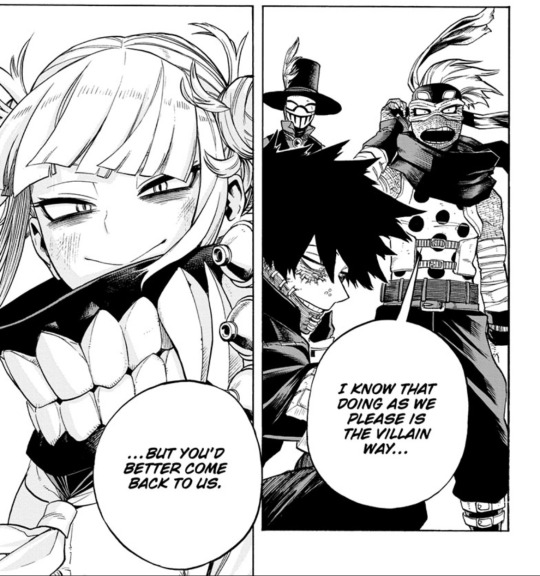
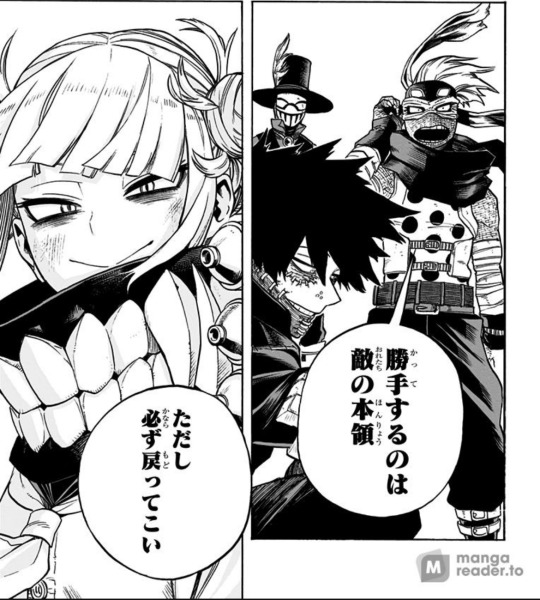
「勝手するのは敵の本領 かってするのはおれたちのほんりょう」
= “Doing as we please / acting of our own volition is our (read as: the Villain’s / League’s) specialty.”
That “our” is like an energetic cord tying Himiko to the League of Villains. It says, “You are not alone. You belong and have a home with us.”
勝手に (romaji: katte ni) means “arbitrarily; freely; of one’s own accord; without asking (permission); voluntarily; willfully; as one pleases; spontaneously; (doing something) by one’s self; one’s own convenience; one’s way.” It describes actions taken by choice, free of external influences like peer pressure or fear of punishment (e.g., criticism, shame, or expulsion from the group).
Due to his own traumatic loss of a friend to a violent end, Aizawa strives to keep his students on a tight leash to decrease the chances of something bad happening to them. To a person like Tomura, who was being raised by his parents in a highly structured and controlled environment and then groomed by AFO to become “a new [him],” having someone dictating to him how he is and is not to think, feel, and behave would feel stifling, oppressive, and triggering. He would feel like a frightened (and angry) caged animal denied its freedom and agency. Tomura hates control, and he chooses to “lead” the League of Villains by, well, hardly “leading”! Every member is encouraged to prioritize their own wishes, needs, and ambitions, and *decide for themselves* the extent to which they will function as a collective or hive mind (“we, us, our”) or as separate but interrelated and interdependent parts (“MY side project furthering OUR shared objective of disrupting the status quo and taking down Hero society”).
Touya and Himiko also grew up feeling unseen, unheard, and smothered by emotionally immature / unavailable / volatile parents who for any number of reasons failed to balance their filial responsibility to keep their children safe with their children’s natural need to be accepted, embraced, nurtured, and supported without conditions to achieve their dreams and develop a strong, healthy, *integrated* identity and self-concept, pride in themselves and their achievements, and a positive sense of community and purpose. The quickest way to alienate and chase Touya and/or Himiko away would be to try to control them, whether by force (“I’ll make you do it! You don’t have a choice about this! I’ve already decided FOR YOU!”) or coercion (“do this or else!”). Despite both having survived alone on the streets for years, proving they are perfectly capable of “roughing it” and making their own way, and despite both periodically running off to pursue their own interest, Touya and Himiko have consistently chosen to remain with the League of Villains because they were able to find in it something they had not been able to find elsewhere: unconditional acceptance, positive regard, protection, support, and companionship. The League of Villains’ dynamics “work” because everyone is free to be their authentic selves and share only as much of their stories as they are comfortable sharing—and with whom they are comfortable sharing. For example, the story implies that Dabi revealed himself to be Touya Todoroki to Tomura and Himiko, but not to the others, some time before his broadcast aired; Tomura, Touya, and Himiko all make allusions to a “plan” that we learn during the PLF War involved Dabi publicly revealing his identity as Touya Todoroki and exposing the routine violence and deception of the Number One and Number Two Heroes to shake the public out of their complacency and blind trust of Heroes. Mr. Compress and Spinner are shown to be shocked by Dabi’s revelation, with Mr. Compress remarking that he was not aware of Dabi’s connection to Endeavor and Spinner admitting that he, too, knew nothing of it. Himiko does not speak of her past often and when she does, she speaks generally, giving few details (e.g., “life is too hard,” “it’s too hard to live being me,” “when I was little, everyone kept telling me to stop being me”), skirting the surface, avoiding the deeper emotional aspects of her story, how she felt, how she was affected.
In No.341 Himiko takes Touya, but no one else, to her childhood house, which has been ransacked, vandalized, and graffitied with horrific messages insulting her and calling for her and her family’s deaths. She leaves him to read every slight against her spray painted onto the exterior walls while she walks through the interior rooms of the house, revisiting painful childhood memories of being snubbed by her own parents and sibling(s). When she is satisfied that she is ready to let go of her past life as the ever-sad-but-always-smiling abandoned child Himiko Toga, she skips out of her family house, feigning childlike lightheartedness (i.e., masking), only to be literally swept off her feet (and have her old familiar mask blown back off) by Touya suddenly blasting the Toga residence with enough force to cause a powerful explosion of fire and compressed air to tear through the structure, shattering the windows and doors and crushing the brick and mortar of the parameter walls. The house collapses into the raging inferno and is gone moments later. Stunned, she stands wringing her hands like a shy child, gently cautions him against taking such aggressive action because they will get “in trouble,” and tells him he is very kind. He repeats the word to himself, choking on it, his voice fading before he can round out the ending. He clearly wasn’t expecting to be complimented, to have his noble act acknowledged, *to be seen*. She didn’t ask him to burn her house down for her and never expected him to. He did that unprompted. We know from No.350 that he had also returned to his family residence at ~17 years old. Like the Togas had rejected and abandoned Himiko, the Todorokis had shunned and forgotten Touya first in life and then again in death. He did not need her to tell him how she felt walking through the ruins of her house to know she was hurting because he had experienced something similar and could empathize with her. He destroyed her house because it had tried to destroy her (and maybe some part of him wishes someone had cared enough about him to burn HIS house to the ground for him). He knew she had returned because she was looking for something she could not hope to find and so playfully teased her for (also) having “a heart indulged in sentiment.” He saw through her weak attempt to deny being sentimental and also saw through her attempt to skip away from her house as if her heart hadn’t just been sent through a meat grinder. He saw her, and, albeit taken aback, she responded by subtly confirming she saw him as well.
As a character, Himiko had always been defined by a neurotic desire to appear “normal” at any cost. She studied her peers for years and adapted their mannerisms to camouflage herself among them as a “happy, smiling, totally normal girl,” despite never actually identifying with them (child and young adolescent Himiko are always depicted standing apart from others, looking out of place and out of sorts, the picture of a person trying desperately to at least seem to be like everyone else; she tried to wedge a square into a circle for over a decade, but ultimately, she could not “fit” where she did not belong). Prior to joining the League of Villains, while she was still on the streets, she became adept at reading people, predicting their next moves, and adjusting her behavior to manipulate outcomes to her advantage. This is how she survived. She learned that the people she was running from day after day—Heroes and police—treated high school girls just a little more kindly, so she began cosplaying as one. She never attended high school (after attacking Saito at their middle school graduation, she took to the streets as a runaway), so she had to have stolen her uniform off of an actual student at some point. Horikoshi wrote that she thinks of her school uniform as a literal “costume.” It is a part she plays, like she might play the part of a strict schoolteacher, but it is not an accurate representation of who she is and was never meant to be. To the contrary, it was intended to be a disguise, another way for her to mask her authentic self in a bid to feel safe. If you never let anyone close enough to see you—the real you, the timid, insecure you who fears she is simultaneously “not enough” and “too much”—then you never give anyone the chance to destroy you with their rejection. If you only ever show up in parts and pieces, then it is only ever parts and pieces that are scorned, rather than the whole. It is better to burn the edges of your paper heart than to burn the meat of it. Really and truly, Himiko is NOT “like the other girls”—she didn’t have the privilege of growing up loved, supported, and protected like they did—but she knows it’s to her benefit to pretend to be. Historically, it’s worked out great for her because everyone she has put on a performance for has fallen for her act... almost everyone anyway. All Might seems to have caught onto her game.
Himiko had always been defined by her obsessive need to appear “normal,” but she took Touya and Touya alone to her house, birthplace of her traumas, because on an unconscious level she must have been hoping (and a small part of her must have trusted) he would prove her parents wrong in their assessment that no one would ever, could ever accept and love her for who she is. He delivered and then some (overachiever, always dramatic).
Everyone in the League of Villains cares about everyone in the League of Villains, but they are not all equally close. Their relationship with one does not look like their relationship with another. The most obvious examples of that are Tomura for Spinner and Himiko for Jin. For them, Tomura and Himiko, respectively, are Special. However close the relationships between members, the League of Villains has never demanded or required emotional self-disclosure for its members to be welcomed, respected, mourned, remembered.
「ただし必ず戻ってこい」
= “But be sure to come back [to us], okay?”
Spinner’s parting words to Himiko before she runs off to confront Ochako are a plaintive request that she return safely to the League of Villains after she has done what she needs to do for herself. Remember: Twice has only just been murdered. The death of their friend is fresh on their minds and heavy on their hearts. Basically, Spinner is saying, “Don’t die and don’t be caught, please. Come back to us, Toga. We’ll be waiting for you.”
Take a good look at Himiko’s face in the first panel.

You might need to zoom in to catch it, but her mouth is twisted kind of like this ~. Her back is to the League of Villains and she is looking at Spinner over her shoulder with a cagey expression. She’s wary, not because she is afraid he’ll hurt her (of course not; he would never) but because she is anticipating that he will *scold* her, like “Mama” and “Papa” did, and try to convince her to change her mind, forfeit her conviction to ask Ochako her question. Did the Heroes recognize her brother Jin as a person, no less human than their own families and friends? If yes, then how could they justify killing him when Heroes claim to be the ones *saving* lives, not *taking* them? If Heroes save lives, and Hawks really is a Hero, then Jin must not have been a person to them. And if Jin was not a person to the Heroes, then it stands to reason that she and her remaining companions are also not people to them and will be killed.
Now look at how her demeanor changes when Spinner does not try to stop her and only asks that she return safely to the League of Villains.

Dabi and Mr. Compress join Spinner on the right side of the panel so that we understand that it is not just Spinner who will be waiting for her but all of them. Himiko fills the left side of the panel, her sincere, if a bit inhibited, smile reaching her eyes, her body angled back *toward* the League of Villains, an illustrative marker signaling that she has received the message and welcomes it, is relieved for it.
#bnha 288#mha 288#bnha manga#mha manga#bnha translation#mha translation#spinner and toga#league of villains#lov#bnha manga spoilers#mha manga spoilers
26 notes
·
View notes
Photo




** Permission to post & translate was granted by the artist
Do not repost/edit the art without permission
Please, support the artist on their page too **
“What is your dream?”, shonen version
Translation and typeset by me
Do NOT repost/edit it on tumblr or any other websites!!!
Artist : @Ruttika_Shin
Source
2K notes
·
View notes
Text
TDDK AU | Each Others' Translator
It was a well-known fact in 1A that Izuku is the Shouto-Whisperer. Shouto wasn't the most talkative person, and even though he was blunt to a fault, his sparse use of words still tends to cause a couple of misunderstandings.
Iida and Yaoyorozu can understand him to some extent, but they aren't as fluent as Izuku, who had the impressive ability to translate a whole sentence even from just one of Shouto's soft hums. They aren't even dating (much to chagrin of those losing in the betting pool) yet Izuku understood the other boy like a mind-reader.
With that dynamic, everyone should've expected that the ability would go both ways
They find out about Shouto's Izuku-Whispering skills when, during a minor villain attack, Izuku is hit with some kind of silencing quirk. Unfortunately, the quirk's effects cannot be reversed, but fortunately, it would eventually wear off. They just weren't sure when that would happen.
There weren't any initial problems. Izuku was a fast writer and he could mostly reply to everyone by writing it down on a notepad, but it wasn't ideal because he couldn't always bring a notepad and pen everywhere.
They finally face a problem during Heroics.
They're grouped into teams and are tasked to strategize on a way to ambush the enemy stealthily. Izuku realizes that he's out of ink and can't convey his thoughts. Hagakure, one of their teammates, suggests that he try to gesture it out. However, when Izuku does, it looks more like flailing than him acting out a plan.
Their whole group is so confused... until Shouto, who is also part of the group, speaks up and says that yes, he can definitely create a platform to the 2nd floor of the building while propelling Kirishima towards the window.
Everyone stares at him - flabbergasted. Asking if he really just understood what Izuku said, and Shouto now returns the confused look and says yes, of course he does, didn't they?
And that's when they find out that Shouto can pretty much understand Izuku as well. Being unable to speak made Izuku's gestures more expressive, but not always clear. Yet Shouto is able to interpret them with no problem, as if they are having a full conversation.
(The stakes in the TDDK betting pool definitely get higher during this time. Also cue more exasperated friends because PLEASE YOU'RE PRACTICALLY BOYFRIENDS ALREADY JUST MAKE IT OFFICIAL WE CAN'T KEEP WATCHING THIS PINING AND OBLIVIOUSNESS).
#tododeku#todomido#todoroki shoto#midoriya izuku#bnha#au rants#yes this was also inspired by a fic i wrote for another fandom years ago#i thought it would be cute with tddk too ksbdjdnf#they are each others translators ur honor#idek if theyll realise their feelings at this time#everyone is exasperated
343 notes
·
View notes
Text
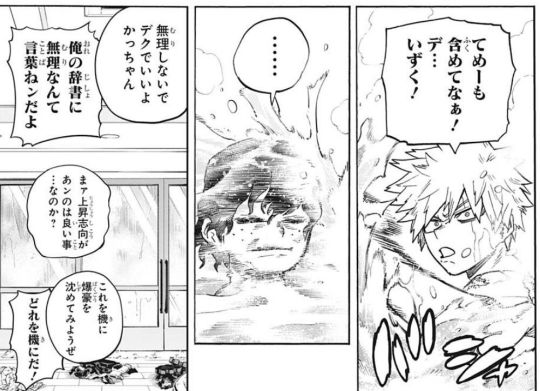
ngl in all of the English translations I've read, Izuku's response here always sounds a little flat to me, like he isn't fazed by Katsuki trying so hard to not call him Deku. I've even seen ones that kind of sound like he's making fun of Katsuki, like "too challenging?"
But in Japanese, he sounds just as soft and affectionate towards Katsuki as he always does! He says, "You don't need to push yourself, Deku is fine, Kacchan!" It reads as totally sincere!
idk man 「デクでいいよ かっちゃん」 (Deku de ii yo Kacchan) just sounds hella sweet to me. The base of the term "don't push yourself" here is muri suru (無理する), which takes the word muri, meaning "impossible" or "unreasonable," and turns it into a verb.
MEANWHILE what Katsuki says back to him is so damn funny. Since Izuku uses muri shinaide to say "don't overdo it," Katsuki says, "Words like impossible don't exist in my dictionary!"
It's funnier in Japanese because he just says the same word Izuku said, muri. "I don't know the meaning of overdoing it!" is a good approximation of the pun, but the secondary meaning of Katsuki not knowing words like "unreasonable" is pretty amazing LOL.
2K notes
·
View notes
Text
Something something there were others with quirks before The Glowing Baby, but because it was flashy and harmless it made the perfect First Quirk story and that trend of holding up the flashy and “good” quirks of society while shadowing all others has been an issue since the beginning…
#bnha#bnha manga spoilers#mha spoilers#bnha manga leaks#bnha spoilers#bnha 407#mha#ig we’ll have to wait for official translations but I’m wondering how he came to the number 50? as is 50 ppl before the glowing baby?#like sir how did you count them? I mean I guess you can comb through birth certificates and stuff but that’s so much work#guess he’s just crazy like that#although I guess if superpowers started popping up out of nowhere that’d be something you’d wanna get to the bottom of
445 notes
·
View notes